#when I worked as an ALT in Japan
Text
Social Issues that Help with Understanding Buddy Daddies
Here are some political, social, and cultural aspects of Japanese culture that I think is important to keep in mind when watching Buddy Daddies. Please note: this is a super long post, with lots of pictures.
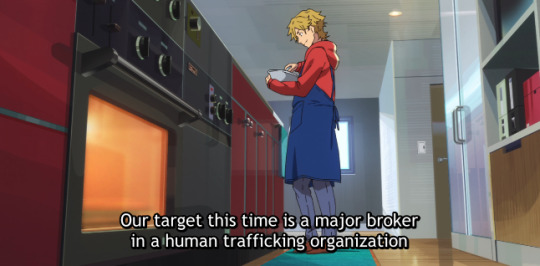
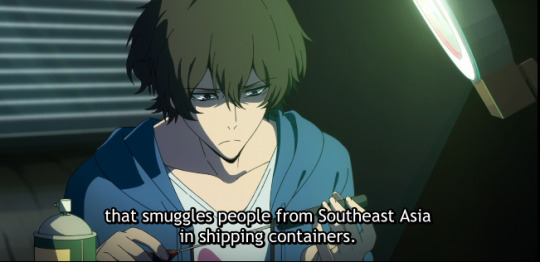
1. Human Trafficking - Slave Labor
In Episode One, we learn that Miri’s birth father was involved in labor based human trafficking involving Southeast Asian individuals. This is currently a very big issue in Japan, since Southeast Asian immigrants (among others) are viewed as a cheap labor option and usually experience slave labor like conditions.
From The United States Department of State website:
Men, women, and children from Northeast Asia, Southeast Asia, South Asia, Latin America, and Africa travel to Japan for employment or fraudulent marriage and are subjected to sex trafficking. Traffickers use fraudulent marriages between foreign women and Japanese men to facilitate the entry of women into Japan for sex trafficking in bars, clubs, brothels, and massage parlors. Traffickers keep victims in forced labor or commercial sex using debt-based coercion, threats of violence or deportation, blackmail, confiscation of passports and other documents, and other psychologically coercive methods.
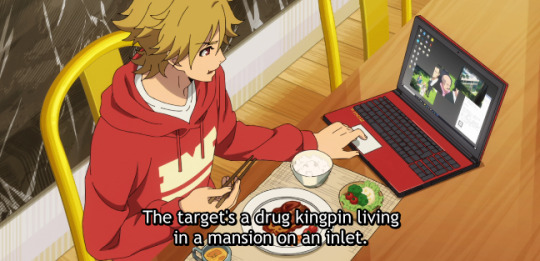
2. Drugs in Japan
When I was living and working as an ALT in Japan, two ALTs (in a different district, but within the same company of my own), got caught with drugs. It was a big deal and ended up in the newspapers. The company I worked for had to do a lot of PR work with the elementary and junior high schools that they had contracts with, to ensure that the contracts would remain. As for me and the other ALTs? We had to sit through like five separate meetings within like two months about drugs and drug laws in Japan.
The barebones takeaway is that, in Japan, weed is viewed as being on the same level as hardcore drugs. Charges can be steep and strict. Even just knowing that someone has drugs, and you don’t say anything to law enforcement about it, can get you in trouble. There is a grey area with drugs, which is stuff like bath salts and the like. Since the selling of things like that cannot be prohibited, so they are easily accessible to the public.
Japan still has a very “90′s D.A.R.E.” approach to drugs. It’s catchphrase is 「ダメ。ゼッタイ。」or “No! Never.”

(Image from a Web Magazine called Nagasaki Press.)
When celebrities are caught with (what’s usually) weed, it can basically be the end of their careers, since recreational drug use of any kind (excluding alcohol, of course), is still negatively looked down upon in Japanese society. This is why it is still heavily left in the hands of the yakuza and drug kingpins, etc. Though there has been a recent increase in protests and ideology surrounding the idea of legalizing weed. Still, not much acceptance for recreational use is likely to come yet. However...
There may soon be some revision to the laws, which will allow for medical use:
Legislation changes scheduled for 2023
In 2021, the MHLW established an expert committee to review the Cannabis Control Act, and it is expected revisions will be proposed in a bill to be submitted in 2023. This will most likely allow for the use of medical cannabis. 2022/12/02
From: Euromonitor
So, something to keep in mind when Kazuki talks about a drug kingpin here is that this drug kingpin is likely not just dealing with super, hardcore drugs, but also softer ones too, like weed.
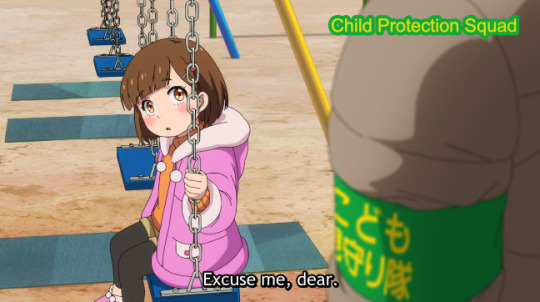
3. Child Protection Squad
There is this misconception in Japan that really young kids, like Miri’s age, can just roam free all around Japan and no one will find it odd. In Episode 1, we do see Miri roaming around the city without anyone really taking notice, but she also wasn’t in an area where there would be people that are trained to take notice.
In the above image she is at a park, which is likely close to a school somewhere. The man that approaches her here has a band around his jacket sleeve that says こども見守り隊 (kodomo mimamori-tai), which gets translated to “Child Protection Squad.” Basically, these are like crossing guards, in a way, because they do play a similar role to that, but they also do more than that as well:
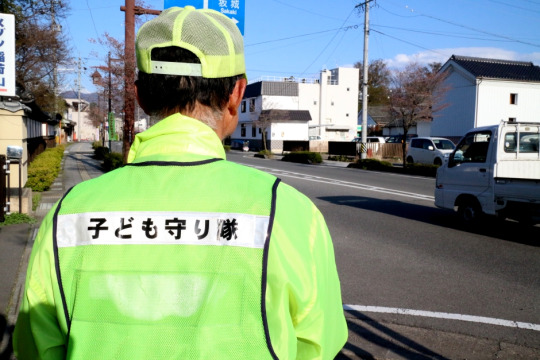
(Image from the Japanese website: Nice Senior).
This people basically ensure that kids stay on the right paths on their way to school. Most of the time, when elementary school children head off to school, they will go in groups (with the 5th or 6th graders being the leaders) and there will often be older people outside their houses on their way in, keeping an eye on the children to make sure they get to school okay.
And that’s talking about elementary school aged kids. For ones that are around Miri’s age, usually the parents (mostly mothers) will bring them by bike:
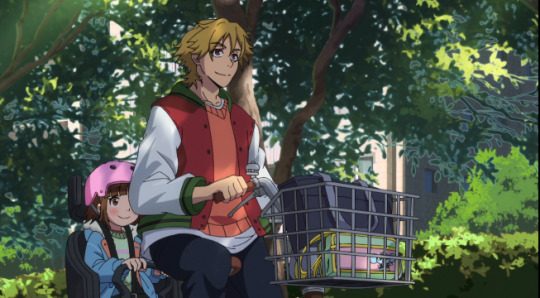
Or they will get picked up by a bus:

This one looks pretty boring in comparison to some others you might see though, like these:

(Image from the Hiyoshidai School Website)
Sometimes the daycare workers will also take them on little excursions outside using big strollers for the kids to travel around in:
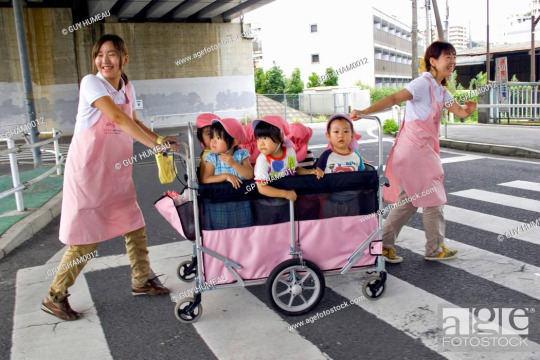
(The image is obviously from a stock photo site called fotostock, but yeah, I’ve seen these before when I lived in Japan).
But a little toddler just sitting on her own at a mostly empty park with just a guy sitting at a park bench nearby watching her? That would raise attention and an eyebrow from someone who is essentially a crossing guard and whose job is to ensure the safety of kids as they travel to and from school.
The rest is under a Read More.

4. Police in Japan
I saw a comment somewhere (maybe it was over on Youtube) about how the cops are portrayed here in Buddy Daddies. The comment was basically that Japanese cops wouldn’t be that aggressive with a child. But, well, cops in Japan have issues like everywhere. Though, the main issue with cops recently has more so been with racial profiling:
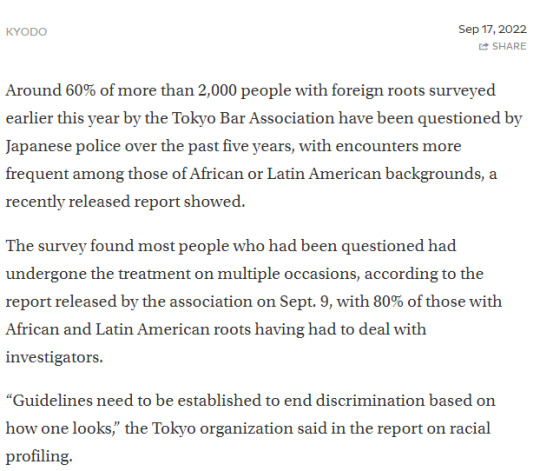
(Excerpt is from a Japan Times article entitled: 60% of people with foreign roots questioned by Japanese police, survey finds).
Of course, this situation is different from the one we see happening with Miri, but the Japanese police have issues with corruption too. So this happening wouldn’t seem too out of the realm of possibilities to me. The anime Tiger & Bunny 2 Part 2 also recently had some moments in the season where there was some anti-cop (ACAB-type) sentiments expressed by a character (though that series is also meant to take place in a city based on NYC).
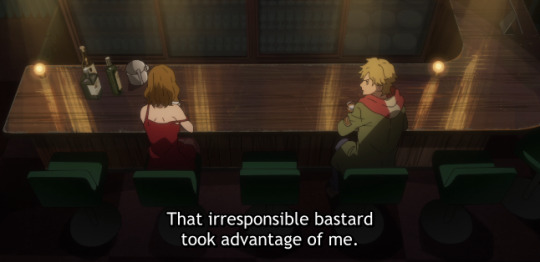
5. Issues Surrounding Reproductive Rights, Contraception, and Abortion
“Took advantage of me” is fairly vague wording, but considering the type of guy he was, and the fact that Miri’s mother is caught in another abusive relationship, it wouldn’t surprise me if Miri’s conception wasn’t fully consensual one. People like to talk about how safe Japan is, but Japan has a lot of sexual violence that goes unreported:
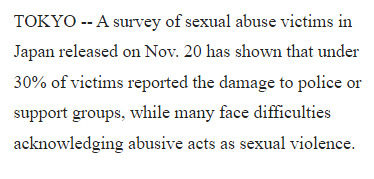
(From an article entitled: Many sexual violence victims in Japan do not report assaults to police, support groups: survey - The article was posted on November 24, 2020 over on The Mainichi news website).
There is a lot of societal pressure in Japan, that can cause a lot of judgement as well. Especially around issues of reproductive rights. From a Japan Times articles entitled: Pandemic provides an opportunity to improve access to contraception, posted on January 30th, 2022, we can get a little insight into the issues surrounding contraceptives:

The article also talked about the judgement that can come with contraceptives. The last line also talks about abortion, which comes with its own set of issues in Japan:

(From The Japan Times article: Abortion legal and apolitical in Japan, but cost and consent present barriers)
So abortion was likely an option that Miri’s mother didn’t think was really viable, especially in her situation.
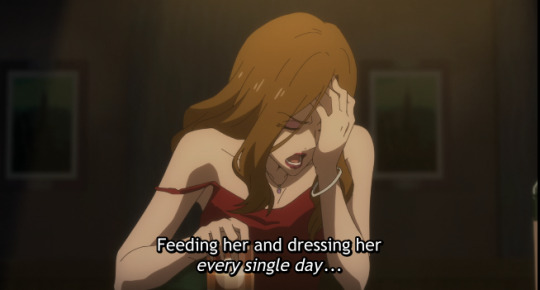
7. Being a Single Mother in Japan, Adoption
In Ep.3 we hear Kazuki parroting a lot of the stuff you usually hear when it comes to women in children, like it is meant to be a natural and innate thing. There is a societal pressure for a woman to give birth and care for the child, even when they aren’t in the best situations to do so. Miri’s mother was, for all intents and purposes, a single mother. Since I doubt the abusive man she is currently with had any hand in helping Miri.
Being a single mother anywhere can be a big challenge, but especially so in Japan. Some issues that single mother’s face in Japan, according to the article “Why Most Families with Single Mothers in Japan are Living in Poverty” from a site called The Borgen Project:
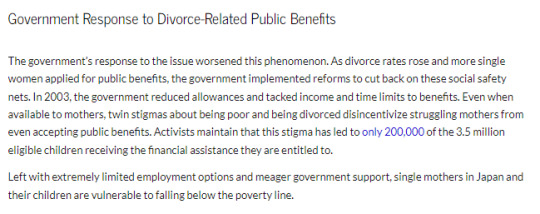
From that same article, we learn that joint-custody and child support doesn’t exist in Japan. So Miri’s mother was likely under a lot of societal and financial stress, along with possible Post-Partum Depression, and (also probable) burnout. This doesn’t mean that her behavior or attitudes are okay, but that they are likely a result of a failed system.
I’ve seen some people bring up adoption, but adoption doesn’t automatically mean that a child will have a better life either. My grandfather’s mother was force to give her children up to the state, so my grandfather spent a good chunk of his life in an orphanage. It wasn’t a pleasant experience. And the probability that Miri would have been adopted had her mother gone through the actual system is, sadly, extremely low. From an article entitled: “The state of orphans in Japan and how to help” found on the site Zenbird.Media is this bit of information:

And even if Miri had been in an orphanage, Misaki (Miri’s mother) would still be her legal guardian.

So an option like that would be unappealing for Misaki, because she doesn’t want anything to do with Miri.

7. LGBT+ Individuals Being Viewed as “Not Productive”
Finally, we have the last thing I briefly want to talk about. The main backbone of Buddy Daddies, which is these two hitmen taking care of a child. Last year, a Japanese politician was in the news because she retracted some previous statements she made in 2016 and 2018. We are going to focus on her 2018 statements, which were:

Her comment received a lot of backlash and was big news. Her retracting her statements also brought a lot of news and talk too. The above information comes from The Japan Times article: “ Japanese lawmaker retracts past remarks on LGBTQ and other minorities.” Her other comments are awful too, but it should be noted that her one about sexual-minority couples stems from the issue of Japan’s declining birthrate. Even though many people in Japan are supportive of LGBT+ rights, there are people that hold a similar viewpoint as this.
Buddy Daddies is pretty directly challenging this ideology, especially with how they have been handling things. So that’s pretty cool and revolutionary in its own way. It makes me interested in seeing how this continued topic as well as any future social issue topics will be handled or touched upon in Buddy Daddies.
If you read this all until the end: thank you so much! I put a lot of work into this write up and I hope it can help (I learned some things too while researching!).
#Buddy Daddies#Kazuki Kusuru#Rei Suwa#Miri Unasaka#Misaki Unasaka#social issues in Japan#long post#meta post#image heavy post
4K notes
·
View notes
Text
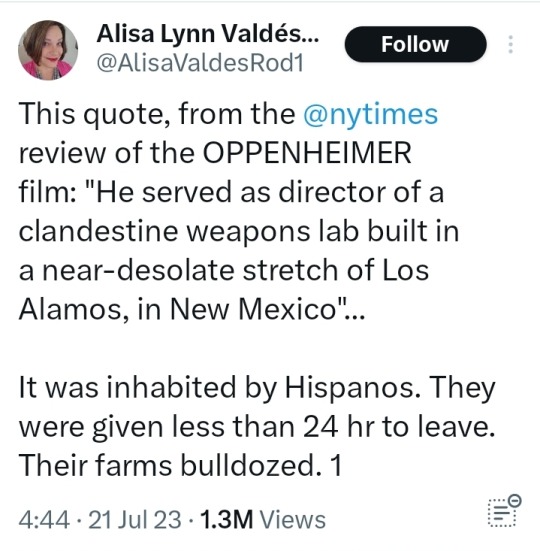
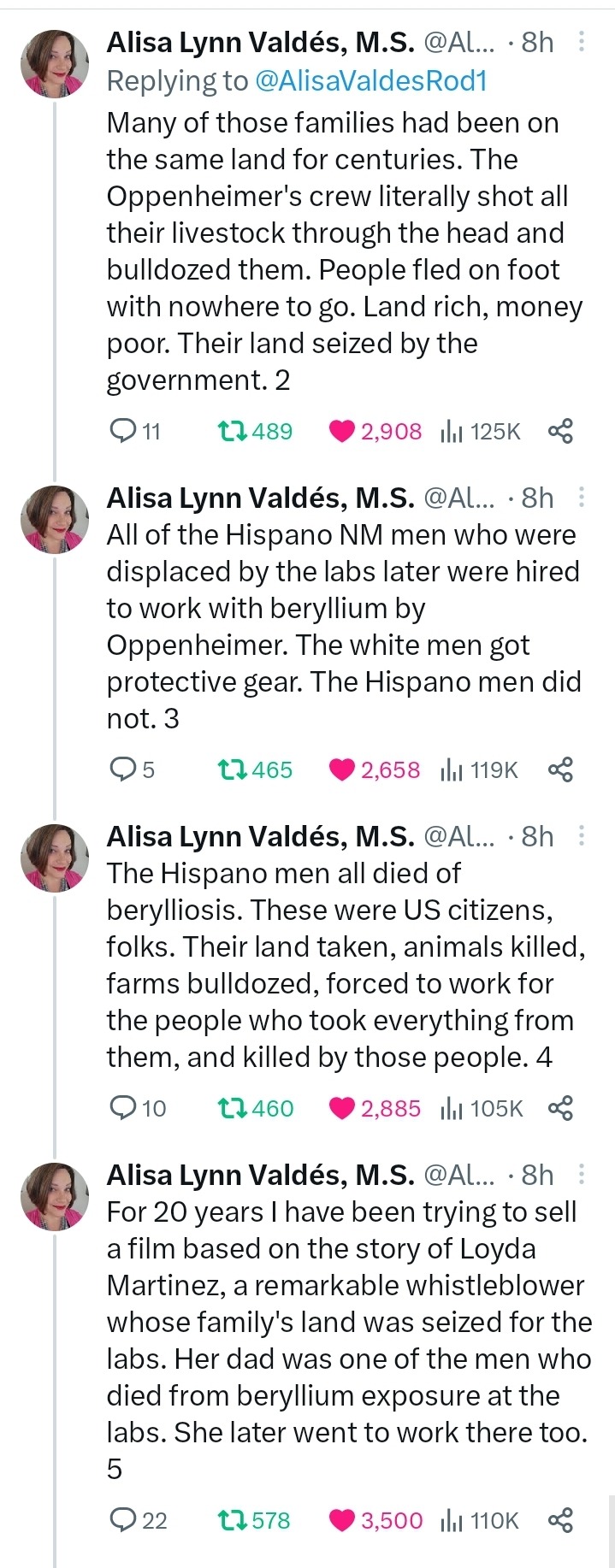

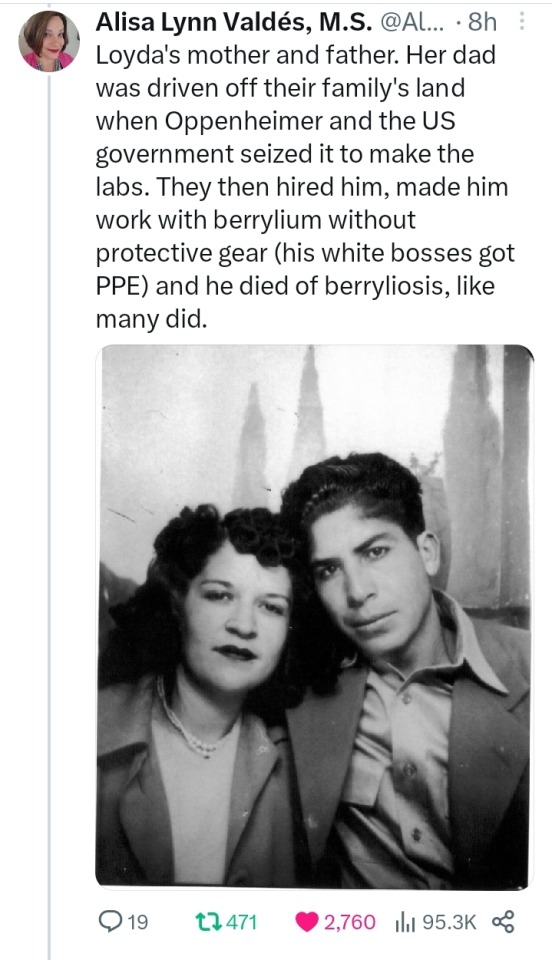
youtube
(alt included in all images)
Another thread by Senator Ben Ray Luján here.
A book on the subject (haven't read it myself):
One of the sources in another one of Alisa's furiously impassioned twitter threads have been debunked, so I didn't include that. But she claims that her own family was caught in the fallout zone when her mother was a baby, which eventually led to her and large numbers of her community developing cancer. It's human for that kind of grief to be caught up in inaccuracies. People are already being ghastly and racist to Hispanos and Indigenous people criticizing the hype for the movie. They're not attacking Oppenheimer for being Jewish, they're criticising the erasure of the human cost of these bombs and the continued valorisation of the U.S military's actions in World War II as some kind of moral saviourism.
While Oppenheimer himself believed that the nuclear bombings of Hiroshima and Nagasaki were morally justified (they had planned to drop them on Germany except they surrendered before they could), he also felt had blood on his hands and regretted his role as the "Father of the Atomic Bomb". He spent the rest of his career vehemently opposing further development of thermonuclear weapons and the hydrogen bomb accurately predicting the concept of mutually assured destruction. This eventually made him a victim of Senator McCarthy's Red Scare and his clearance was revoked. I haven't seen the movie (Christopher Nolan is the kind of casual white racist I avoid on principle) but people who have seen it say that it doesn't glorify nuclear weapons and depicts the man himself with the complex moral nuance that seems to be accurately reflective of his real life.
The backlash to Indigenous and Hispanos people's criticisms and to people pointing out that Hiroshima and Nagasaki were genocides is also frustrating because...both world wars were a clash of genocidal empires. The reason they were world wars is because the countries colonized by Japan, China, the European powers and the US were all dragged into it, whether they wanted to or not. Jews were one of the many colonized peoples that suffered in that time, who were left to die by everyone until they could be used to frame the Allied powers as moral saviours, establishing a revisionist nostalgia for heroism that powers the US military industrial complex to this day.
As early as May 1942, and again in June, the BBC reported the mass murder of Polish Jews by the Nazis. Although both US President, Franklin Roosevelt, and British Prime Minister, Winston Churchill, warned the Germans that they would be held to account after the war, privately they agreed to prioritise and to turn their attention and efforts to winning the war. Therefore, all pleas to the Allies to destroy the death camp at Auschwitz-Birkenau were ignored. The Allies argued that not only would such an operation shift the focus away from winning the war, but it could provoke even worse treatment of the Jews. In June 1944 the Americans had aerial photographs of the Auschwitz complex. The Allies bombed a nearby factory in August, but the gas chambers, crematoria and train tracks used to transport Jewish civilians to their deaths were not targeted.
(Source)
Uncritical consumption of World War II media is the reinforcement of imperialist propaganda, more so when one group of colonized people is used to silence other colonized peoples. Pitting white Jewry against BIPOC is to do the work of white supremacy for imperialist colonizers, and victimizes Jews of colour twice over.
Edit: friends, there's been some doubt cast on the veracity of Alisa's claims. The human cost to the Hispanos population caught downwind of the nuclear tests is very real, as was land seizure without adequate compensation. However, there's no record I can yet find about Los Alamos killing livestock and Hispanos being forced to work for Los Alamos without PPE. There is a separate issue about human testing in the development of said PPE that's not covered here. I'm turning off reblogs until I can find out more. Meanwhile, here's another more legitimate article you can boost instead:
#Youtube#colonialism#colonization#genocide#oppenheimer#nuclear war#nuclear testing#indigenous rights#racism#new mexico#american imperialism#world war ii#hispanos#tw: animal cruelty#loyda martinez#white supremacy#military industrial complex#generational trauma#worker exploitation#colonial trauma#hiroshima#nagasaki#war propaganda#knee of huss#twitter
873 notes
·
View notes
Text
split
pairing(s): sub-zero/bi-han & reptile/syzoth x reader (seperate)
synopsis: shang tsung’s proposition tempted you. his powers guaranteed so you took it. how can they see you now, when you’re going against your morals for yourself?
alt: requested by this ask!
notes:
- reader is gender neutral
- anon, thank uu for requesting !! i also wanna mention, im capable of writing for most of mk1 characters :] i should’ve specified on my pinned comment but as long as you read my rules, it’s all good
- btw this was such a fun concept to write !!
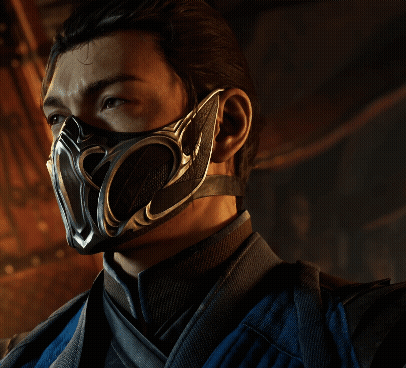

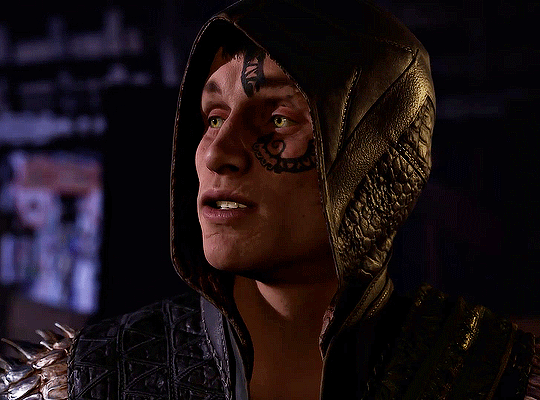
BI HAN/SUB-ZERO
-> It works in his favor, while Bi-Han struggled to make amends for the well-being of Lin Kuei. Circumstances were failing him - his father, no doubt, created a bad example for him. He could not guide him on the significance of maintaining order on Earthrealm. Your recent habits did not surprise him - you were always a kind-hearted person. You were the one who helped Tomas when he struggled to make a perfect score and who volunteered additional counseling for new Lin Kuei trainees - you were dutiful to follow his steps and to protect Earthrealm.
-> But perhaps on that day, when Shang Tsung turned Bi-Han against his brothers, it made you think twice about what was at stake. Kuai Liang knocks him out and brings him back to the compound in solitary confinement. “Kuai Liang told me you aligned with the enemy?” You questioned, him half expecting you to be furious at his endeavor. The Lin Kuei's Grandmaster scoffs at the mention of Scorpion, his scorned brother, the one to betray him. “He was a fool otherwise - What Shang Tsung offered will lead The Lin Kuei to glory.” Part of Bi-Han’s mind pondered your disapproval of his defiance - you always disliked the mistreatment of power, leaving no justice for those less fortunate. Why you are willing to stand by his stand is unknown to the Grandmaster.
-> You do not visit for a few days, and the cryomancer grows wary of your rejection against him. Coincidentally, you were more aligned with his younger brothers, accepting the peace that Liu Kang made - you were never to oppose, even suggesting alternative solutions when issues struck. Liu Kang nonetheless appreciated your advice but never took upon your suggestions. Bi-Han feels enraged by this - you had many skills, faring better than some of his soldiers.
-> The night he escaped the compound, Sektor and Cyrax reassure him of your safety. It was your idea, and Bi-Han feels relief when he encounters you keeping watch. Lin Kuei soldiers – devoted to him and your cause, are by your side, monitoring the site. The Grandmaster drained from numerous hours of inactivity, bolts to you. “I thought you would stay,” Left me – a fear he would never tell. However, you catch it in his eyes, promising, almost pleading for you. “I am by your side, Bi-Han,” you say, interlacing your hands with his. “Never forget that.”
-> Your peculiar habits began bit by bit after the battle with Titan Shang Tsung. With the service of Sektor, Bi-han was able to elevate the Lin Kuei with cybernetic soldiers. He acknowledged this was the more reasonable choice than Shang Tsung’s soul stealers as it was discreet from Liu Kang’s notice. You believed the same - the Lin Kuei required more allies, and building their strength would be a nifty task. The revelation brought you to the masterful sorcerer. Shang Tsung is disingenuous but does not worry you. As long as he did his end of the bargain, you considered - would be adequate. In exchange for control, he could summon you at any time. An easy compromise that you assumed - would not disrupt Lin Kuei’s plans.
-> Time after time, you were not like yourself. You felt you had gone through a dramatic shift after inheriting new powers. It was as if you were reborn with greater intention. The things you used to tend for did not feel the exact or vital. Scorpion and Smoke pointed this out when they witnessed you again in Japan. Things have changed — you have changed. They could see it in your eyes and demeanor. You were no longer the gentle and maternal figure they grew up seeing.
[ bi-han ]: together, side by side, the lin kuei will fare no better glory.
[ you ]: if only kuai liang and tomas understood this.

SYZOTH/REPTILE
-> Syzoth is worried about you. Every minute you stand by Shang Tsung’s side, darkness infests your mind. Syzoth had bare witness to the mischievous schemes and understood it would be detrimental for you. Compared to him and everyone else, you were the last person someone would wish to pursue into madness. How should he explain this?
-> When Syzoth met you, it was a pure accident. You were gazing through the multiple fruit stands the city had to show. He was performing a show per Shang Tsung’s persistence. To reveal his Zaterran qualities, Reptile continuously did tricks, transforming back and forth between forms. His stunts were not the first thing that captured your stare. But merely his smile - you knew what happiness and joy felt like. From afar, you saw how broken he was. At the end of the night, Syzoth scurried backstage to prepare for the following day. Unexpectedly, you arrived, arms crossed behind your back with a cutely curious expression. “You’re the performer, right? The one with Zaterran blood?”
-> “What does it mean to you? Here to insult me?” His voice is sharp and rigid as he dismisses your presence, shaking the boxes beside his tent. Numerous strangers were keen to spend time with him. Most enjoyed the entertainment he produced. You saw the void Syzoth had, standing out on the podium like a puppet. It was degrading to a living being. You wanted to help him - however, Syzoth rejected it. If Shang Tsung witnessed your compassion, who knows what manipulative excuse he would use?
-> Though it struck him by surprise what Shang Tsung told him the following morning, “A benevolent soul has sent their regards to you and has convinced me to travel with us. I must thank you, Syzoth.” Horror struck the Zatterian as if he had witnessed the most vile crime. His intent was never to pursue you into his mess. Nonetheless, he frets for your safety and what would happen to your mind once corrupted.
-> Your innocence is what kept Syzoth going. In the opaque chasms of Shang Tsung's experiments, you were the one person he could lean on when circumstances had driven him mad. You are supportive and affectionate. And you know the ways and words to console him from his night terrors. While the longer you stayed with him, the more you saw misconduct and depravity. There was an appeal to the sorcerer. Born with little power, you became curious for a better life. Shang Tsung gladly offered and gave you what you considered a gift from the Elder Gods. Like day and night, you were conspicuous with your odd habits. There were times Syzoth questioned your motives, always collecting materials for Shang Tsung and Quan Chi. You were delighted to comply with their requests, even going out of your way to exploit their payment.
-> However, one thing he knew that was true was your fondness for him. You deeply cared for the shape-shifting Zatterran. Always there to safeguard him from unwanted matters. All the horrific experiments tormented him. And when they fetch new subjects, the laboratory would be the worst place to reside. The nauseating smell of flesh and blood could never escape him. That is the burden Syzoth must carry forever. You were his guardian angel in some ways. In frantic need, you make all his fears go away. Simply by your presence alone, Syzoth will feel at ease. Where he is near, you are never too far off. You have sacrificed much for him.
-> The two of you looked out for each other. There was no line you would not cross to save Syzoth. Even now, as you two fled the wretched laboratory of his former master, you had suggested killing the Earthrealmers. Which Syzoth immediately brought down, scolding you for how casual you made it sound to be. Johnny, Kenshi, and Kung Lao were not like Shang Tsung. They were deemed trustworthy - for setting him and you free from imprisonment. He knew you meant no harm, simply looking out for his safety and yours. Syzoth hopes one day to change your perspective on outsiders and Earthrealm alike. He believes you would thrive better here at Lord Liu Kang’s sanctuary.
-> Initially, the Fire God had given his friend, Johnny, a questionable look. After he deemed him, you, and Asrah compatible with Earthrealm's cause, you were welcome with open arms. It was the first step for you to contemplate and rehabilitate yourself. He hopes for you to stay away from harm. Syzoth all knew of the toxic threads Shang Tsung had placed on you - he anticipates you freed of them. And to allow yourself to aid people for the greater good.
[ you ]: don't believe all of what liu kang has to say.
[ syzoth ]: why? and trust shang tsung instead?
#mortal kombat#mortal kombat x reader#mortal kombat 1 x reader#mortal kombat 1#mk1 2023#mk1#mk x reader#mk1 x reader#mk headcanons#bi han#bi han x reader#bi han x you#sub zero#sub zero x reader#syzoth#syzoth x reader#reptile#syzoth x you#reptile x reader#reptile x you#honestly based#reader is kinda evil uhmmm
153 notes
·
View notes
Text
Calling all Submas fans!
Do you want Ingo and Emmet to reunite in Pokemon Masters?
The game developers have released a player feedback survey, which, among other things, asks what stories and trainers we'd like to see in Masters in the future. Notably, one suggested option is whether we would like "stories that continue the ones in the main Pokémon games". Another asks "what combination of trainers you would most like to see interact in Masters?"
It would be great for all Submas fans to fill it out and suggest that they give closure to Ingo and Emmet's story! There's precedent for such a thing - the long awaited reunion between N and the BW protagonist (Hilbert in Masters) happened in the Story Event "The Ideal Formula" (a YouTube recording of the story can be seen here https://youtu.be/zWyiuVVigMo?si=8UHz6xbcVvgI4URN).
Some reasons you could use to justify why they should let Ingo and Emmet reunite in Masters:
The arrival of Hisuian sync pairs such as Irida, Adaman, Akari and Rei make this interaction plausible and highly anticipated.
Ingo and Emmet are two of the most popular trainers from BW/B2W2, and only got more popular after PLA. They have a massive fanbase, both in Japan and internationally, that would be attracted to the game (and incentivised to pull) if such an event occurred.
Although another version of Ingo already exists on Pasio, similar things have happened before with alts such as Classic Elesa, Champion Iris and Kimono Grimsley (from his appearance in Alola).
One of Masters' greatest strengths is that it is uniquely positioned to deliver character writing and interactions that the main games were not able to address. Such as the aforementioned reunion between the BW protagonist and N. This would utilise that unique space to finally give closure on Ingo and Emmet's unexplained and heartwrenching separation.
But don't feel the need to use my words - use your own! Unique responses are great and also increase the chances that we'll be taken seriously.
So where's the survey link? Well, I would link it, but every user account in Pokémon Masters (when set to English - you can change this in the settings!) has its own unique link with an id generated on the end. The survey technically still works without it but I'd prefer to be on the safe side to make sure our answers count! The survey can be found in your message box (after setting your game language to English as necessary.)
The survey runs from 10/29/2023 11:00 p.m. PT – 11/12/2023 9:59 p.m. PT. So we've got until November 12 to spread the word!
Note that every person can only fill the survey out once.
We nearly got Ingo to be the #1 Tumblr Sexyman. We can do this!
credit to @cefren for the getting the ball rolling on this campaign!
167 notes
·
View notes
Text
countries and cities i've been to that i think the lost light crew will enjoy (vol. i)

i think ratchet would like switzerland. snowy alps, open green fields where purple and yellow poppies littered across the grass dance with the northern wind. he enjoys the secluded valleys and will spend hours just driving past the topaz lakes. he likes the quiet of it all, the serenity, the closure. he makes drift join him in their holoforms to walk, taking in the traditional log houses and brightly-colored buildings, shops, and restaurants surrounded by lush woodlands, upland meadows, and snow-capped cliffs. grindelwald because drift is fascinated by humans and their winter sports, ascona for when it gets warmer and the boats are out by the docks. in a first contact au, ratchet would most likely end up working in either zurich or geneva, working closely with earth's international bodies like the united nations to facilitate human-cybertronian relations. i can also see the medic crew stationed there as well; running the first cybertronian medical facility on earth.
drift, predictably, would prefer japan more. osaka and tokyo for its entertainment, where he and rodimus would spend hours exploring the nightlife in their disguises. at times, they would even go as their alt-modes. rodimus gets ahead of himself with all the attention he's getting. he'd travel through many prefectures, driving past the borders to clear his head — perks of having a conjunx that works closely with human organizations is that he gets exempted from all the paperwork — but always end up somewhere private, tranquil. the shrines, the forests, the mountains — he would even be bold enough to dream of settling down there. one time ratchet flew in to visit him at a resort by the foot of mount fuji, and his husband was neck-deep inside the natural saunas. content and purring, sinking into recharge against the stones.
i have a feeling brainstorm and skids would stir up trouble somewhere in the netherlands. most likely in the infamous lecture halls of leiden university, where great minds like descartes and rembrandt once walked in. they'd hate the weather, where the sun becomes optional the moment it hits autumn (even before, apparently.) the roads are small, so they'd have difficulty navigating at first, nearly driving into a canal because of how fast people bike. direct, with just the right amount of witty, the pair are glad to enjoy the company of dutchies without having to rely on their (human) food because nothing that they've seen looks appealing or digestible. getaway is also there, most likely in amsterdam, where his holoform is most likely to get cornered in an alley and have his bike stolen.
nautica would love the sea, the vast, great open oceans of southeast asia would be the perfect place for her. ever the adventurer, she would drag riptide and velocity with her to explore the islands of the philippines & indonesia. where she'd learn how to dive and swim with the animals past the coral reefs. sweet girl nearly cried when she saw a group of whale sharks. anode and lug are content sitting by the beach, sipping on their latest invention — coconut-infused energon. bali is where i imagine the girls ( and riptide ) would go for a nice getaway. the people are all smiles, warm and friendly, and passionate about their culture. even if the two are more inclined towards the sciences, the flourishing art and spirituality of the balinese people made them feel at home again. ( if not nostalgic for caminus.)
i know rodimus is living his life in spain. maybe it won't be his designated home on earth. but with the lost light stationed in geneva, where ratchet, minimus, and megatron are with the rest of the united nations council ( because there is no way they can park the ship anywhere in the new york branch ), barcelona was his first solo trip on earth without straying too far from his co-captain's watchful eye. it was the peak of summer and there he was under the sun. the people were only initially surprised, but then again, they'd probably seen weirder things than a sixty-foot-tall robot asking them if he could join their game of volley by the beach. he bumps into krok and his rag-tag team — who's also trying to get away from minimus — so that's how he and misfire end up nearly drowning after a competitive game of water tag.
#i hope these are accurate let me know if i should fix something !#dutchies i'm speaking from the heart when it comes to the food i cannot anymore live off bitterballen & haaring#nee bedankt#transformers#maccadams#drift#misfire#nautica#mtmte#skids#idw mtmte#mtmte x reader#mtmte imagine#lost light#idw transformers#transformers lost light#tf headcanons#tf imagines#tf idw#transformers headcanons#transformers hc#tf hc#lost light x reader#lost light au#getaway#brainstorm#imagine#transformers imagine
77 notes
·
View notes
Text
Love & Process: blue (2002)
Hello to everyone reading, and welcome to a highly belated attempt to squeeze some of my thoughts and emotions through some semblance of a creative process and onto a page. Today, I want to introduce this blog by talking about a lovely film, blue (2002), directed by Hiroshi Ando and based on a manga by Kiriko Nananan.
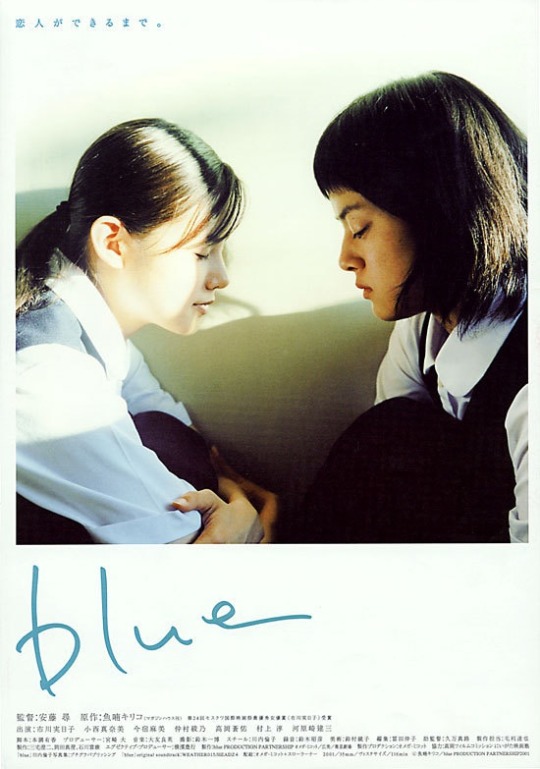
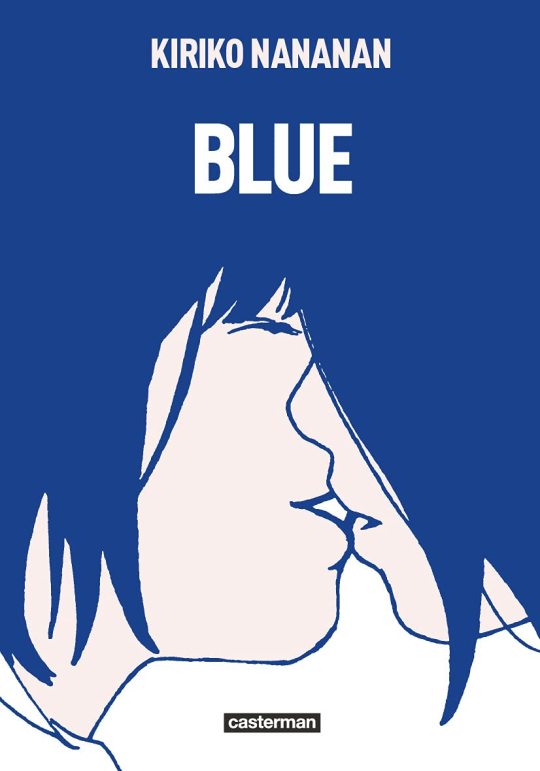
Since I'm still somewhat new at diving into live action film, especially, like, uh, Japanese indie film, its helping to start with the yuri genre. Because like practically any other woman on this site, I quite enjoy lesbians. blue's manga original offers something of an alternative to the yuri norm, though, and the film follows suit. Both are definitely examples of the Japanese filmmaking trend I've heard of called "mumblecore," (or maybe mumble-komi for the manga equivalent) that most people know through the likes of Inio Asano's early work. Like Solanin or Girl on the Shore, blue is shoegazey, quiet, and contemplative, adorned with moments of subtle physical intimacy, layered emotion, and stunningly beautiful compositions of daily life.
My metric for these kinds of slow mood pieces, which I've previously tended to watch at random whenever the mood struck me, is that if my barely-medicated ADHD brain can even finish them, there's clearly something special going on. blue passed with flying colors; yeah, ok, it took two sittings, but I spent all of both enraptured, immersed, and invested in the mono no aware of silent, fragile love and messy asymmetry that formed this movie's emotional palette. blue is about love, of course, but its also about process and expression, both emotional and creative, and how processing things, artistically, verbally, non-verbally--is often required of real, human love.
In being about this, I think it did things for me that a lot of yuri often doesn't and gently hit me in a place that I really needed to be hit. So, let me get into it. This is going to be...very personal, and also obviously spoil the details of the film, if you care about that, although I'm sure there will be plenty of depth left in the text that I leave untouched. Whether you read it or not, I'll be happy I made it. Oh, and sorry if I come off as really New for being so struck by themes and aesthetics that are probably sort of standard for this type of film. I can't help what I feel like writing about, though.
------------------------------------------------------------------------------
Kirishima Kayako lives in a small town by the sea, one much like dozens of other anonymous, disaster-prone exurban towns in Japan at the turn of the millennium. She rides the bus to her girls' high school every day, where she eats lunch with her friends and tries her best to learn something in class. Really, though, she's aimless, quiet, lonely, and introspective. She's trying, but its rare for others to be able to tell. She's also in love with her classmate, Endou Masami. When she confesses at the end of the first act, on a windy beach against the vastness of the ocean, Endou responds that she's glad, and the two become our lesbians for the movie. Kayako falls to her knees and cries in relief. Masami is different from the others--she sees how hard Kayako tried. Does that mean she loves her back, though?
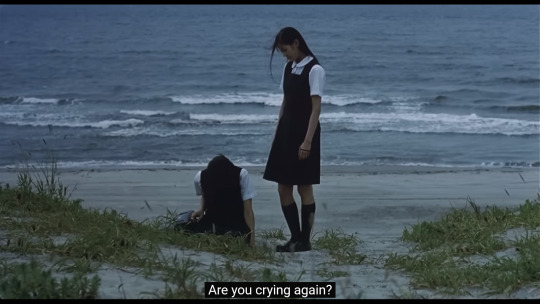
Endou Masami has cool passions and interests; she collects American CDs, which she expertly critiques and describes while lending to friends. The mere view of her vibing to her American alt-rock while smoking a cigarette in front of her apartment window is album-cover worthy in itself. Kayako feels the same way: one of the most intimately gay scenes of the pre-confession portion of the film is when Masami lights a cigarette and asks if Kayako is shocked. The quiet girl declares without hesitation, "No, I'm admiring the way you lit the match."
The whole early film is such a delectable, lonely vibe. The slowly intertwining couple's solidifying dynamic is the kind that forms between an emotionally complex introvert and the perhaps even more unknowable yet somehow more confident object of their affection. The two are classmates, (there's no classic yuri kouhais and senpais here) but for the early part of the film we are seeing things from Kayako's perspective and Masami seems unmistakably older in spirit. There's something about the dense emotions conveyed in her gazes at her new girlfriend, the almost world-weary tinge of recklessness in her distant grins. She talks about music Kayako's never heard of and lends out books with Romantic-era paintings that she has well-formed thoughts on. Kayako even openly admits that if she could, she would want to be Masami.
I think we've all loved a girl like that.
It's a pretty typical experience in middle school or high school, for really anyone lonely who loves women, to be drawn to these sorts of sad, beautiful, oh-so-seemingly-complex femmes. I guess straight men have a similar thing going on with the whole Manic Pixie Dream Girl archetype, but for us women (or, women-to-be, at the time, I guess), the phenomenon of these people to us often involves a sort of existential jealousy. I'm not sure what is so alluring to other people about the sense that the object of their love has Something Going On that they are working through, or a vast and complicated life beyond the scope of one's understanding, but it me it always felt like something I was missing out on for myself. Obviously, a lot of their experiences and interests must be interesting and fun and super cool, you think, but even what pain you think they convey must be somehow more edifying than yours.
For me, the edifying aspect was the mere fact of femininity itself. The idea of a girl who has deep and Real emotions, who feels Real love and Real sadness and can actually express that in how she looks, beautiful and imperfect, always threw into stark contrast my own inability to express myself comparably. I was depressed, I was growing up, and I felt things, too, but, as someone who everyone thought was a straight boy and who was too scared to admit to being otherwise, I lacked that sort of beauty, that means of expressing what was inside me through fashion, makeup, book or music knowledge or taste. Or at least I thought I did. Thus, my own emotions must have also meant less. So, I ignored them and belittled them, and entire years passed before I processed a thing correctly. I always wanted to be some other girl. That was the only thing that would fix me.
I assume that the teen (and, uh, sometimes beyond) existential pining experienced by some other people in real life usually lacks the fun bonus that mine had of a screaming void where my femininity should have been, but I'm not sure how much this actually matters to the crux of the kind of experience I'm talking about. That some kind of void is there is all that matters, really, and its there for Kayako in her relationship with Masami at the beginning of the film. She has nothing, Masami is everything, and just being close to her is enough, for now. Just being noticed, just sharing something with her, is all Kayako feels like she can ask for.
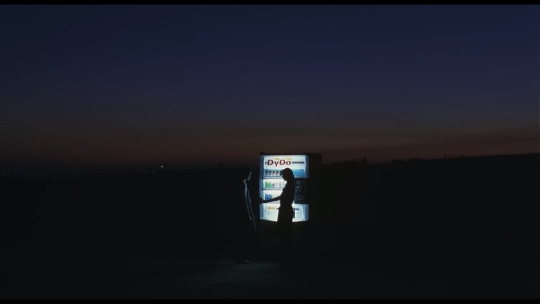
Of course, this incomplete way of seeing love can't last, which brings us to the next part of the film, which starts when the two are hanging out and Masami reveals through a guarded, distant grin that she had an abortion a while ago. This isn't something that shocks Kayako or is really meant to shock the audience, and it isn't the big moment where she forced to reconsider her feelings. Rather, she asks how it went, and Masami responds honestly. She mentions she felt horrible the next day and had to be picked up by ambulance from the nurse's office, prompting Kayako to recall silently what to us was the film's first scene, a view from her window during class of an anonymous ambulance, sirens turned off, discreetly rescuing a student.
That she had this ambiguously traumatic, and at least unpleasant and potentially taboo experience is something that could have made Masami feel even older to Kayako, her pain even more distant and obscure. It certainly already is a way that Masami herself feels distant from others. Yet, by considering her own special, observant view of the ambulance back when it happened, it becomes one that Kayako can in some small way assertively share with her. Rather than continuing to put her lover's experiences on a pedestal, Kayako in this scene makes a silent decision to turn a blossoming mutual acceptance simply that they happened into a moment of true intimacy between the two, a sleepover punctuated by smirking kisses and satisfied cuddles initiated by each of them for the other. Despite her remarks that Kayako is weird for unhesitatingly wanting to stay with her, its an intimacy that Masami is happy to accept. This is all an important turning point in Kayako's development because she begins to choose insight, closeness, and assertion over the distant admiration that trapped her earlier.
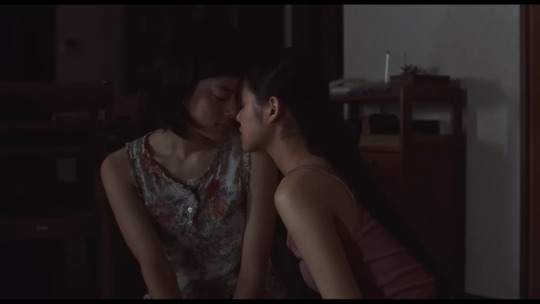
As we go on, we'll start seeing how blue's gentle impact comes from the way it doesn't glorify or sugarcoat that earlier kind of unhealthy and immature dynamic. Instead it subverts it by giving Masami depth and Kayako agency, before reaching an endpoint that reflects on how the dehumanization of that kind of depressed, pining relationship can be overcome. In that sense, blue is a yuri romance mostly about the couple coming to accept their own and each other's humanity and capacity for expression. Like any good mumble movie, its full of long silences and almost unrealistically hesitant dialog, and doesn't give any explicit internal monologues like a lot of manga do. The world of this movie is one where expression is an uphill battle, something that has to be worked towards and struggled through. It's the world that Kayako and Masami share, in their own separate ways. And that's why its such a triumph to watch Kayako finally find her voice, her passion, and her process, which all starts in this scene.
First, though, it's time to learn about the Something that Masami has Going On.
Things begin when Kayako is still sleeping. Masami gets a call on her house phone that she doesn't answer, but that sends her into a silent spiral of emotional dread. She spends the next day at school in the nurse's office, refusing to tell Kayako what's going on and confiding only in her friend Nakano. Then, when summer break comes along, she disappears, leaving Kayako alone at home, pouring silently over the book of still life oil paintings that Masami lent her.
It ends up being Nakano who tells Kayako why she left. It's the story Masami didn't tell about the source of her abortion: an adult, married man whom she had a relationship with and eventually a pregnancy from. She got things taken care of without telling him, alerted her parents and tried never to see the rotten salaryman again. That is, until he called. He wasn't getting along with his wife anymore, apparently, and she had some sort of attachment to him that made her come running back. Her taste in music originally came from him, after all. It seems that, for the time being, her devotion to this mysterious, abusive man is going to perpetuate a brutal cycle: she'll keep hurting both Kayako and herself all at once.
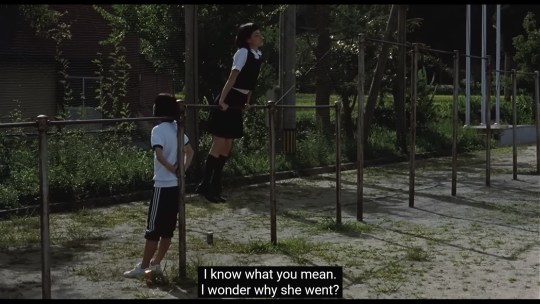
What really destroys Kayako and her relationship, though, is that she lies about it. When she comes home after some predictably rough interactions with this guy, she tells her supposed girlfriend that she was enjoying a vacation with friends, and even gives her some grapes, supposedly grown in the prefecture she was hanging out in, as a twisted souvenir. The more assertive Kayako enforces her boundaries without hesitation, though, in equally as blunt a tone as she complimented her love, as when she told her she wanted to stay with her, all those nights ago. "Why are you lying to me?" Its with that same grin, now tinged with emotionally oblivious deception, that Masami dares to at first first feign ignorance.
"Eh?" Her smile is shallower than its ever been.
So Kayako walks away.
Their dynamic has now become worse than just immature; it's entirely toxic. From an outside perspective, Kayako is working on her shortcomings, while Masami refuses to reconcile her past. This kind of toxicity, though, is sadly just as common in high school (and even sometimes middle school) as is the kind of misunderstanding, lonely pining I talked about earlier, just usually among different sorts of people. Appropriately, its often even that exact kind of beautiful, hurting, mature femme (in the eyes of disastrous, moody lesbians like Kayako) who is going through that sort of pain. Its that mysterious and tragic byproduct of compulsory heterosexuality that causes a lot of girls to seek validation in the love of an older man, and that I imagine becomes a sort of addiction to that validation that only masquerades as love. Hell, Masami attributes much of what made her seem so interesting on the surface, her love of music, to this guy. She feels like she'd be nothing without him, and the way Kayako praised her, at least in the way she interpreted it, did nothing to dispel this fear. Which I think is really why she decided to go back, even though it would mean betraying the very girl whose love provided her an escape from it all.
Its an ugly truth, and its one that yuri media usually shies away from portraying, but it is explored with refreshing frankness and resolved with astounding maturity by the end of blue. And I think its the source material's status as "alternative" (I guess in Japanese parlance, Garo-inspired) manga, not to mention the movie's simply as an independent film, that allows it to break with genre limitations in this way. There's been tons of writing done on how yuri definitely presents a fantasy of the sapphic experience. Mainstream yuri's origins in Class-S still to this day often cause it to portray romances between women as fundamentally different, and inherently more pure, than those involving men, trapping them in a bubble of unassailable innocence. While that kind of makes sense and seems extremely cool to those of us who celebrate having little interest in moids or whatever, it also has the effect of sugarcoating and sometimes even outright obscuring what real women, even (and sometimes especially) sapphic ones, go through.
There's already a decent amount of yuri, especially among those aimed at older demographics and those where its more of a secondary genre, that do deal with compulsory heterosexuality and the experiences that come with it. What are much rarer are yuri series where one of the lover's flaws more resemble Masami's than Kayako's. Not enough that I've read at least is willing to make its relationships messy, or have one of its leads just do straight up bad things like self-destructive cheating and lying.
Because, really, its the same as what Kayako went through, isn't it? The lonely longing for something more that feels like it can only be cleansed by denying oneself all one has and betting it all on being close to someone else. The only difference between the two's actions is temperament and perhaps socialization--one sought it from a cooler woman, the other from an older man. And somewhere out of sight, that sad, irresponsible, fucked-up adult was probably hopelessly lonely, too, just like Kayako had to accept Masami was. Maybe disaster lesbians, disaster bisexuals(?), and yes, disaster straights aren't so different after all.
Well, other than that Kayako has worked to process her feelings, while Masami went and ruined her relationship over them. That's an important difference. Still, though, even Kayako has some work to do about how she feels about all of this. Masami's pedestal has been smashed, whether she likes it or not, and now she's lonelier than ever. So where does this vampiric cycle of taking from others end? What substance can replace loneliness in this ouroboros of etropic emotional alchemy?
Kayako doesn't touch the grapes. Instead, she silently processes things, lies on the floor listening to the cicadas scream in the garden. The grapes go rotten, and her brother throws them out. She sulks for a while.
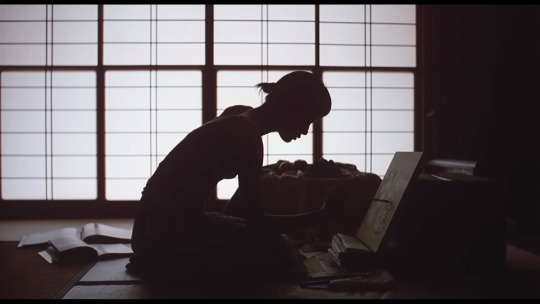
Then, she starts painting. A still life of grapes, inspired by the books that Masami lent her. At first, her drawing is lousy, as the school fine arts instructor later tells her, but the colors are gorgeous. The deep purples of the fruits are expertly layered to capture light and tell a story, one deeper than the instructor could possibly imagine. It's the story not only of the transformation of a relationship, but of the growth of one of its participants. As the hot, still air of the coastal Japanese summer cloys around her lonesome final vacation of high school, Kayako finally salvages a passion to call her own out of a floundering relationship. When school starts again and she picks up art classes, going to Tokyo for uni, a dream that was previously held only by Masami, starts to be within her reach. She has a future, an interest, and a way to process all has happened to her.
And then comes the time for Masami to try and return. She proves unwilling to address all that happened before, instead trying to kiss Kayako after school in the art room. Her undeserved attempt at intimacy is rejected with a shove, but so too is her self-pity that causes her to instantly run away. There's more that needs to be said that simply "I'm a terrible person." Kayako pursues her into the town's small shopping district as night begins to fall and neon crackles to life against a cool late summer night. Now the emotional climax of the movie begins.
First, Kayako starts talking. She tells Masami about the painting, about her summer, about how lonely she was without her, about all the places she wanted to go with her. She talks about how happy she was at the same time that she found something she wanted to do without her. This approach is new for her. She's never so far relied on words so heavily to express her emotions. When Masami points this out, Kayako says:
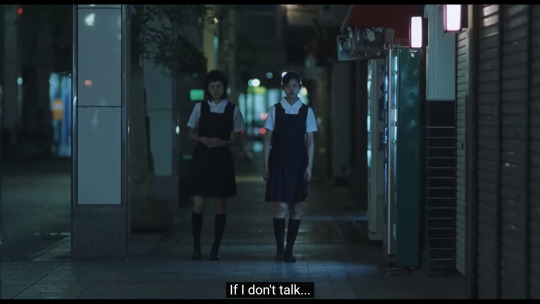
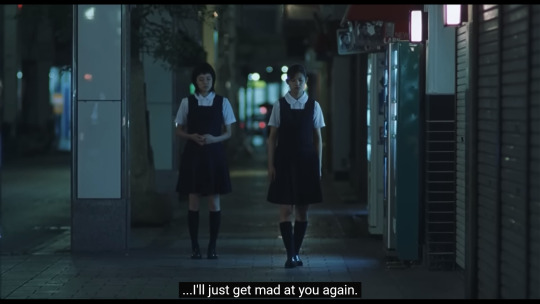
This is how she's choosing to process things for the time being. At first, it was being silent to carefully consider her emotions. Now, its speaking up to keep them focused on what she really wants.
Then, its Masami's turn, for the first time, to tell the truth. By now they're away from the small cluster of lights, staring out at the blackness of the beach where they first got together. Masami broke up with the guy, she says. But she also asserts that she came to his emotional aid to begin with because she felt his need for help was more important than anything else to her. She couldn't tell her girlfriend this before, because doing so would mean telling a truth she didn't think Kayako could bear to hear: that he meant more to Masami than she did.
Kayako already knows this, of course. And by speaking up to quell her justified anger, by weaving words like the deft strokes of honest color on the tip of a paintbrush, she's gotten herself to a point where she can accept it, too.
I mean, think about it. Masami is broke now; Kayako needed to buy her a sandwich so she wouldn't be hungry on their impromptu date. Her sabotaging drive to be validated and her inability to accept love from the girl willing to give it has, by all accounts, ruined her life for the time being and harmed those around her. Even though she broke up with the guy out of necessity, or out of some fleeting impulse to run back to Kayako, she still feels like nothing without him. As she says to Kayako later, now the envy runs in reverse--Kayako is passionate about painting now, while Masami will still amount to nothing. Despite it all, though, Kayako is willing to love her. She's called Masami out on what she needs to be, then decided to stay nonetheless.
"I always come second. You broke up with him, so the number one spot is vacant. When someone else comes, you'll put him there...
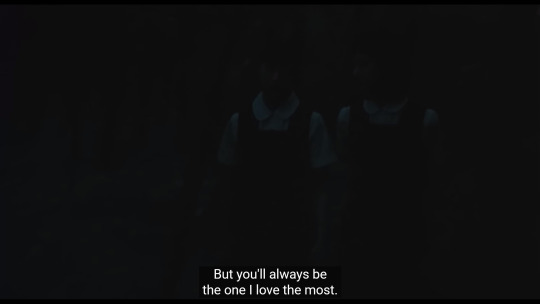
------------------------------------------------------------------------------
For most of my life, I believed that artistic expression was primarily the product of unrestrained, innate, and self-indulgent passion. I thought it was just something people either have or don't have, and that when they do, its something that can drive them to great heights of accomplishment and happiness otherwise impossible for humans to reach. It was mostly Japanese otaku media that instilled this into me, I think. I grew up exposed to a dizzying array of diverse and often miraculous artistic products that captured my imagination in ways the safe output of my own boring, monolithic home empire never did, and most of them were made by people who literally poured their lives into working on them. From Eiichro Oda's future-destroying, decades-long devotion to making One Piece to Kentaro Miura giving his life to practically paint the ceiling of the Sistene Chapel in pen on page after double-page spread in Berserk, to all of the hyper-passionate, universe-shattering early works of Hideaki Anno and his animator cohorts, I thought that I lived in a world of weird and wonderful treats whose cooks had the work ethic of demigods and the talent to match.
And even on the lower levels of the medium, among fan artists, cosplayers, writers, posters, historians, I felt surrounded by people who lived and breathed impossible passion, whose lives must have been defined by a kind of information processing my brain simply wasn't capable of. They had some ability to inhale the miraculous vapors of an abundant artistic landscape and spew out works of their own that further decorated the texture of a fleeting age of impossible marvels. And all that time, there I was, left on the sidelines, interested in many things but passionate about none, and lacking the motivation to really work to pursue anything at all. It was (and, honestly, still is) a state of existential discomfort similar to that sort of lonely-girl-pining, but doubtlessly far larger in scale. Some people had passion, while I had nothing to show for all my years of being alive. For fuck's sake, there was so much stuff out there, and I barely could muster the motivation to even read any of it most of the time.
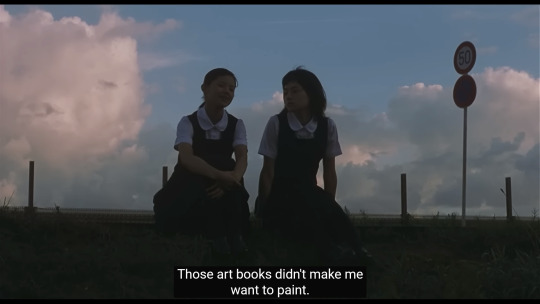
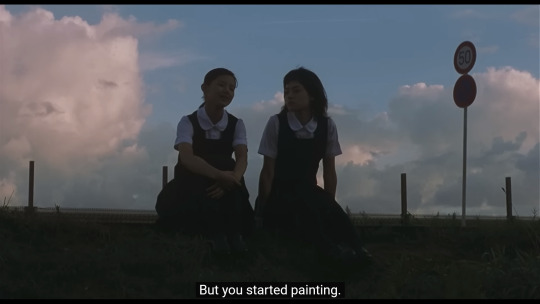
After a while, I started to feel like I was simply broken, like I was an empty person that didn't belong in the very world I loved living in. And while I think this might be a niche outlook and insecurity (although one represented, to my profound gratitude, in Masami), I think it's also how a lot of people think about love. Love is often portrayed as a feeling sparked entirely of instinct, one that, when a person truly feels it, will never cause them to make any mistakes or do anything fucked up to those they care about. Something that will drive those bolstered by it to impossible heights, improve lives beyond the sorrow and loneliness to which they are otherwise condemned. But, as Kayako learned and as Masami and I are having to find out, that isn't really the whole story.
Expression is love. Love is process. Therefore, expression is also the labor of putting love through a process, of rigorously trying to get your ass in a seat and put in the steps of putting your feelings into form. As this is required of art, so is it required of relationships. And so the two are a cycle. Creation requires emotions to process; relationships require emotions to be processed. And the love that creation inspires feeds itself into the love for others that inspires the emotion to fuel more creation. A Labor of Love. Again, I know I'm New.
But this is what Kayako has been working up to all movie long, first with her silence, then with some words, then with the labor of painting, the iteration of getting better, then with more words again. She has found a slow cycle that is elevating her above her loneliness, a cycle that Masami helped create, and is welcome within, but that can, if need be, exist without her.
Love, labor, process. Expression, creation, process. Creating, processing, choosing...in the end, to do it all again. To stay with what--and who--you have labored to love. And that is the choice Kayako has made.
I have not yet answered what, after thinking and writing about this movie for days on end, might be the substance that can replace loneliness as fuel for the alchemical cycle of emotional taking and giving. By the end of the lovers' reunion, sitting by the road under the slowly-illuminating blue of a haphazardly-clouded dawn sky, Masami doesn't feel like she has an answer, either. She feels small and hollow, manipulative and weak. She's jealous of the coping strategy her own girlfriend has developed to deal with the effects of her bad behavior. So, in the end, what is she? What is there even left for Kayako to love?
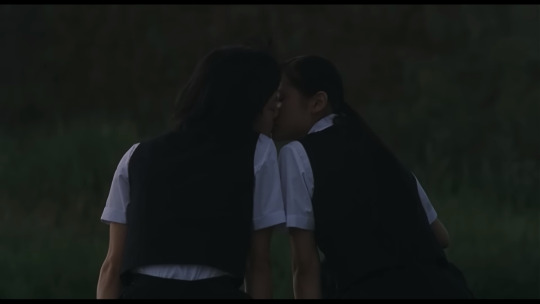
I'll be honest, this feeling is so fucking real I get perilously teary every time I think about it. Because, for as much as I mused about Kayako's feelings resonating with me as a former and sometimes girl-piner, when it comes to my current relationship at age 22, it's Masami in whom I see myself most clearly and brutally. It's hard not to when she is the only representation in romance, let alone in yuri, I have seen so far who is as much of a fucking brat as I am at times. Whose tendency to sabotage her own relationship makes it so asymmetric that what her girlfriend feels appears almost one-sided, but whose love is real all the same. If she lacks process, talent, maturity, mystique, if no one is ever going to be good enough for her, then what at all does she have left?
The answer to all of this is the thing that lies at the core of her being, that makes her who she is. The source of her potential to express herself, the starting point of a process yet to fully begin. It's hard to see, but it's there. Its what makes her Endou Masami. And its what Kirishima Kayako loves the most.
It's color. It's the thing at the core of creation that can't be described with words, that forms the motivation for any process. Its the vivid purple of a painted grape whose intentional creation transcends deception and nurtures discovery. It's the blue of a dawning sky whose light guides two girls in messy, lopsided love back into each other's arms. It's Kirishima Kayako. It's Endou Masami. It's what everyone has, and it's all anyone has.
It's the source of love, its process, and its object.
------------------------------------------------------------------------------
Eventually, Kayako has to leave for Tokyo. That's the decision that's best for her, and its a decision that, for the time being, will leave Masami behind in the countryside, hard at work on the process of learning to love herself. At the end of the film, she sends Kayako one final piece of proof of who she is. It's a painting of sorts, recorded on VHS, composed not of oil but of compressed light and sound. Stylistically, as the camera zooms in, it begins to resemble less Renoir and more Rothko: at first, its the beach, then, simply the point of the horizon, the area where the sea and sky meet. Its raw, not quite processed, pure color, vibrant blue, filtered and compressed into chunky, washed-out 800x600.

By way of description, "this is all I can do."
For years, I've struggled to believe that my emotions, hindered by depression and self-sabotage, have any value at all. As someone for whom love, passion, and expression have always felt difficult, even putting my thoughts down on a page, let alone drawing, painting, composing, or directing, has always seemed impossible. Recently, though, I've grown a lot. I've found the beginnings of a process learned to accept its existence. Both this process, and all the loves that go along with it, are often uncomfortable. They are painful and brutal and blissful things into which to pour the labors of communication and the torments of understanding. I've learned to process discomfort for the sake of creation, to create for the sake of love. It sounds cheesy, but again, I can't help what I wanted to write about.
I hope you'll join me as I find more new things and tough feelings I love to process on this account. There's so much more I'd love to say about blue, just for starters. I could talk about my undying appreciation for the work of Mikako Ishikawa, or how the shots in this movie are so gorgeous and evocative that I'd seen many of them before in "Japan in the 00s" vibes compilations.
But, until then, this is all I can do.
#japanese film#japanese cinema#yuri#yuri manga#lgbtq films#teen romance#pining#film analysis#personal essay#blue (2002)#kiriko nananan#mumblecore#long reads
85 notes
·
View notes
Note
Please please please please PLEASE!!! I NEEEED to know more about the knight au!
I will GLADLY tell you more dear anon! Its still in production, BUT my thoughts go something like this:
The Bots and Cons have landed on Earth in the 8th century rather than the 21st. Due to series of mishaps, the Autobots end up scattered all over the world initially. They get back together quickly once groundbridges are established, but the bots have already taken on new appearances by that point. With no vehicles of reasonable technological quality on the planet, the bots have instead taken on the only metallic thing on the surface, that being armor.
The story progresses differently with Fowler being a sword for hire from Baghdad territory and June being a former Abbess. Jack is June's son as normal and he is training to be a Squire. Rafael is the eighth son of the resident Lord and has taken to training to be a scholar since it was either that or the monastery. Miko is a young Japanese recently orphanage child who got picked up by Wheeljack when he found her freezing to death on the streets. The language barrier between her and the others is quite real and so she largely relies on Wheeljack and Bulkhead to translate as she learns the language.
This story takes place in England and the Autobots camp out in a castle that Fowler took for himself and his mercenary crew a few years back. The Con's keep their warship but struggle to locate the Autobots due to the lack of any and all tech on the planet.
Its still a work in progress, but here are the design bases I have so far.
Ratchet landed in Norway and ended up getting himself Norse armor design something like this:

Bumblebee was plopped down in Wessex and choose Saxon styled armor as his alt of choice.

Bulkhead got thrown toward China against his will and found himself bulky as ever.
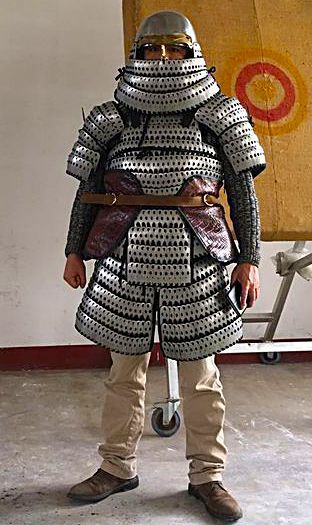
Wheeljack was thrilled to find himself in Japan when he arrived and promptly picked the armor that suites him best.
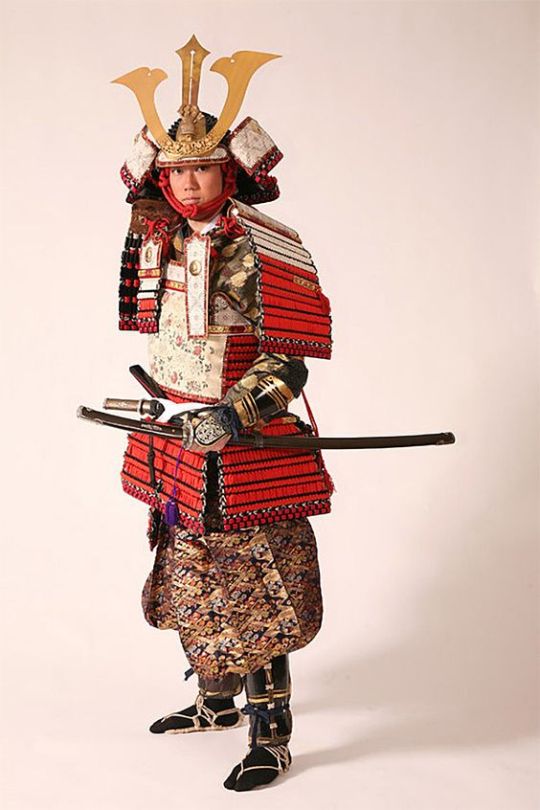
Arcee crash landed in Baghdad territory and chose the only armor that allows her to move.

Cliffjumper landed himself in North America and was rather starved for options, but he chose anyway.
He has the weakest armor out of all the team. He tried his best, but his armor barely qualifies as such due to the lack of metal. He looks the part though.

As for the Cons? Haven't thought too much about them yet, but Soundwave got himself something like this:

#maccadam#transformers#transformers prime#alternate universe#knight au#draws chatters#team prime#tfp kids#june darby#agent fowler
51 notes
·
View notes
Text
Just saw a really clickbait-y youtube video that called Blue Lock fascist in its thumbnail and I will admit first and foremost that I didn't watch it and yes I've been informed that it isn't implying that Blue Lock is some fascistic propaganda but it still got me thinking so-
here's my rant/breakdown about the ways that Blue Lock is specifically anti-fascist
So first of all, popular animes and mangas having possibly fascist undertones is nothing new. I won't deny that there's a long history of Japan being a colonizer and commiting atrocities that are still brushed off or forgotten about to this day. And this does seep into some works that I personally choose to not engage with for exactly that reason. Miss me with trying to be an apologist for or glorifying real world war crimes- But Blue Lock specifically? I'd be extremely hard pressed to call it fascist.
Fascism is defined as an alt-right, ultra nationalistic political ideology usually characterized by a centralized autocracy, forced suppression of opposition, belief in a natural social hierarchy and subordination of individual interests for the believed good of the nation or race according to Wikipedia. First let's go through the ways Blue Lock does match up with that.
Ego can be easily viewed as a dictator near the beginning of the manga
Most characters thrive on putting others down for their faults and strictly believe that there is some sort of natural order where people who lack "ego" are at the bottom
There is a sort of central autocracy with the top 6
Near the beginning especially, there is a violent snuffing out of any ideology that dares oppose egocentrism or the idea that you need to be a solid team to win a game
Now let's go through the ways Blue Lock denies and even goes against Fascism.
BLLK's main goal is to make a Japanese soccer team that can win a World Cup. In a more fascist manga, we would see racism ga-fucking-lore. We can see this in animes that have more right wing leaning undertones like Attack on Titan where when race is brought in it's for conflict. There's no possibility of harmony, only winners and losers. Those protected and those put down and punished.
And Blue Lock does have an extreme focus on who wins and who loses. It is not afraid to include racism against Japanese people like with Adam or portray black people in unsettling and kind of racist ways like Dada's original design. But these elements don't automatically spell fascism. Blue Lock is careful to portray characters of color as just that, characters. They don't exist to tell you about their lives of hardship and struggle and they don't exist to justify Ego's obessesion with creating a good Japanese team. As you read BLLK, you'll notice that the artist has taken care to get better at drawing different body types and facial structures. The character design isn't trying to sell some perfect ideal like fascism so famously does, it tells you a peak athlete doesn't have one distinct look. It tells you characters from other countries are just as if not more capable than the Blue Lock boys. Hell, even Sae's hatred of Japanese football is portrayed as less of a betrayal of country and pride and more of a cultural clash. The issue to be solved in Sae's character is the way he looks down on his brother, not how much he despises Japanese football teams' tactics. We know this because Ego himself rails against them too.
A fascist manga would paint Sae as a villain for even learning from and joining teams from other countries, lending them his talent instead of keeping it in his home country. But Blue Lock encourages diversification and collaberation with other nation's teams so heavily that it is literally an entire like 5 part arc right now. Ego isn't ultra nationalistic, he just wants to make a better soccer team for his country and he isn't afraid of praising and adopting from other countries in the process. The biggest win to come out of a Blue Lock team wouldn't be that they're all Japanese but that they all follow his ideology.
Speaking of his ideology, Ego is extremely harsh and controlling, yes, but he also believes in the boys. He lets them do what they believe is best. He pushes them to their limits, not because they disobey him, but because they dissapoint him. A true fascist dictator would rule with fear with no introductions of other ideologies, he would strike at any sign of weakness or opposition. At the beginning, he does do this. But as the manga goes on we see how much wiggle room he's willing to allow. He lets Isagi curse at him and question his leadership, he lets Shidou play even though he's clearly queer and extremely volatile, he doesn't punish any of the boys for injuring each other. In a fascist society, you are expected to fit an ideal or be othered, be perfect and work together with a sense of comradere because that's the only way to prove your claims that you are the best race/nation. There can be no imperfections or cracks in the facade...But Ego lets the boys be messy. He never forces them to change who they are, only forces them to believe that they can do great things all on their own. Even with Kunigami, Wild Card wasn't a correction of his disbelief in some nation or race, but instead a correction of how limited his mindset was. In fact, in a more fascist society, Kunigami's love of playing hero and protecting his teammates would be praised and celebrated. Ego putting individuality and aspiration over the good of the team as a whole is literally a middle finger to fascism.
The villain of the series is literally a greedy Japanese man that wants to commercialize the team and make them less individualized. I don't know how much more anti-fascist you could get-
Also, Blue Lock handles disability very carefully and very well. In more alt-right ideologies than not, something you'll see again and again is this idea that disabled people don't deserve the same rights because they can't contribute to society. Disabled people are a stain to be pushed away and hidden because they contradict the central idea of a "perfect" nation. In a fascist retelling of BLLK, Chigiri would be kicked from the program, not given power and influence. In a fascist retelling of BLLK, Kenyu would be attacked and beaten as soon as it was discovered that he made it into the top-six with failing eyesight. Any physical disadvantage could easily put an athlete at the bottom of the social hierarchy as well, Blue Lock could have very very easily made fun of its disabled characters for even trying. It could get away with mistreating these players and be defended for it so fucking quickly. But instead, it lets you root for them and gives them just as much care and weight as the others. It's trying to tell you that being a good player sometimes means knowing your limits and getting help, not punishing yourself because you have some biological disadvantage. It also takes care to demonstrate that no race is inherently worse at soccer than the other.
And, of course, the elephant in the room, Noa and Kaiser. Okay...if you see German characters and immediately think OMG NAZIS??OMG FASCISM?????OMGGGG HE HAS BLONDE HAIR???AND BLUE EYES?? That's a fucking you problem and you clearly aren't reading the manga. Even Noa Noel being an older man and still being allowed to play and looked up to as the best is an example of how Blue Lock goes against steriotypes about athletes. Kaiser does have blonde hair and blue eyes yes, but he also wears eyeliner and eyeshadow and has a tattoo and dyed hair... None of that would be allowed in an actually fascist Japanese manga unless it was as caricature to make fun of and dominate. But instead, Kaiser is an actual threat who has complex arcs and behaviors. Also, Kaiser isn't fascist himself, he clearly views Isagi as an equal even though they're different nationalities and he doesn't believe in any one authority or greater cause except for himself. Noa is very strict yes, and he does rank and rate the boys, but he specifically doesn't factor race into it. He also, just like Ego, allows other ideas and patterns to emerge even if they mess up his own plans for matches. He doesn't suppress anyone and is actually extremely lax. If you think he or BLLK is "fascist", look at actual real world sports teams and their strict practices or past statements about other nationalities.
Isagi as a protaganist is anti-fascist too!!!! He's a Japanese everyman who has good Japanese parents, no disabilities, an honest personality and believes in a future where Japan wins the World Cup. In a fascist story, he'd be fucking untouchable (ESPECIALLY against characters from other countries) and all of this would be paraded as proof that a Japanese soccer team is clearly superior and all-dominating. But no! He gets beat down, questioned, disrespected and constantly shown up by others. He's not special and he's extremely self-centered. He doesn't water his own beliefs down for the "good of the nation" or whatever the fuck and he grew up idolizing foreign players. Isagi never supresses other people's ideologies, he just makes fun of them if they fuck up. He's never xenophobic, even when other characters have moments that have xenophobic undertoens like Adam or Sae's comments. Isagi Yoichi's character could have a few traits flipped and be a poster boy for some alt-right manga about how superior Japanese people or hell, Ego's pupils are. But he doesn't. He's simply designed and he's rude and he looks down on people, but he also apologizes, humbly accepts when he can improve by questioning his own ideals and is open to talking with everyone he comes across.
Calling Blue Lock a "fascist soccer manga" is not only demonstrating that you have no idea what fascism is, but also disgustingly painting over all the beautiful themes and messages within the manga.
Again I'm aware that that original video wasn't aiming to negate any of these points but I have seen people make claims and jokes before that about Blue Lock's more *beat it into your head* tendencies with ideology. And I've seen jokes specifically about the German team/the way Sae seems to just hate Japanese culture. I just dislike the painting of Blue Lock as a jumping point for discussions about fascism and its effects because of the way it handles themes like cross cultural connection, family pressures, capitalism and disability so carefully.
#blue lock manga#bllk#blue lock#plot analysis#JUST HAD TO GET THIS OUT THERE#and yes i have blocked people for kaiser nazi memes so don't fucking make any . he literally wears eyeliner and has a homoerotic obsession#with an asian guy. the nazis would hate his ass#character analysis#character examination#bluelock#bllk manga#bllk anime#bluelock anime#anyway i detest everyone who acts like blue lock having some extremely strict rules etc = it being ultra right wing#there's horror in it for sure but not that way#in fact it takes EXTRA EXTRA care so that it wont be taken that way#like you clearly dont actually take japans history seriously to try and paint BLLK as nationalistic#There are so many better examples..stop eroding peoples media literacy#And i DO NOT want people to start reading blue lock bc they think its fascist or they think it has controversial shit in it. like ew.
46 notes
·
View notes
Text
Worldbuilding: !@#$ the terfs, be more creative with gender and bio sex than a binary system.
9.5 times out of ten the majority of gender systems I read in US books are really, really uncreative, and I do mean that because manga, has more creative gender systems than a lot of US books. I love you Melanie Rawn, but still, the inversion as good as it was in the uncompleted Ruins of Ambrai, still was largely a European system because it was largely a commentary on the European system. (Yes, I did understand that.)
And the US tends to, very much accuse other countries of having uncreative gender systems that are absolutely rigid, say the US to Japan. (Though the usually [white] understanding of Japanese gender is usually abysmal... but that's a whole paper and a half there.)
When building a gender system, be more creative! You have this other fake culture. You can do whatever the heck you feel like. Say, the Barbie Movie, which hilariously the alt-right USian detested, though it still was a commentary on mostly US gender norms.
Can't we loosen this up a little? You have literal aliens and you can't imagine a more creative sex and gender system than the binary? Oh really? Humans aren't even binary on either.
I'm going to give cultural examples.
Introduction
Bugis have 5 genders.
BTW, someone got so mad when I pointed out the page they cited said that Bugis recognized 5 genders, they went on a youtube rant about it. lol Deal. BTW, people put a lot of emphasis on Bissu like how people hyperfocus on trans women in the US because masculinity is that fragile.
Albanian is complicated.
Some countries/ethnicities have 3.
India has a 3 gender system in Northern India.
Women, men, Hijra
I mean this list:
Some countries don’t even define the two gender system the same way (Europeans are sooo uptight. Loosen up.)
For example, a Korean man wearing pink--no problem. No one flips the hell out when a man in Korea wears a hanbok with a chima and a jeogori. They are like cool. He can do as he likes. Even baksu wear chima in religious ceremonies. They believe it gives them extra powers.
The whole pants. are. for. men. and. women. only. wear. skirts.
Oh c'mon...
Pants were invented for horseback riding--like the heel.
So let's get this mind-numbingly straight (pun somewhat intended here) Men, are men because of horses. (haha, yes, Barbie reference), thus have to wear pants. But are absolutely effing forbidden from wearing heels, which are also associated with what? Horseback riding. Hmmm...
And men still wear dresses and skirts, but they call it by other names.
Judicial robes for sale, and look, a man is wearing them.
But--But that's soo different from a dress...
https://www.net-a-porter.com/en-jp/shop/product/la-doublej/clothing/maxi-dresses/muumuu-printed-silk-twill-maxi-dress/38063312420399795
This is a dress because as Webster's Dictionary says:
: an outer garment (as for a woman or girl) usually consisting of a one-piece bodice and skirt
Yes, it's worn by a woman. I couldn't find another definition.
But men also wear sarongs. And bath towels, and kilts all of which look suspiciously like skirts. And togas. Which shows how fragile the definition is that you need to narrow the definition that much.
And freaking for those religious, God on the Sistine Chapel, by suspected maybe gay Michelangelo, has a vaccuum sealed butt on the Sistine chapel wearing a pink dress.
C'mon, we can be more creative than this, surely. I mean, if you look at this super rigid gender system, does it make any sense at all? OK, I'm NB and all, but seriously, I look at it and go, WTF happened to you?
You get so uptight about men wearing lace, stocking, high heels, dresses, pink but forget so quickly that less than 200 years ago, no one gave a damn, and if a man didn't wear those things, he couldn't make it in high society.
I mean...
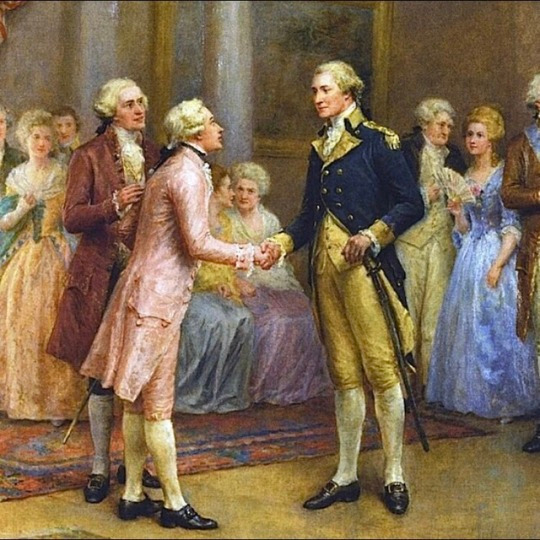
Lafayette, wearing pink, heels, stockings, lace (his collar), and a wig. Give me a break here.
And gender definitions change over time...
Just about 100 years back, in order to be out and gay, it was thought your entire gender was different. There was nothing like a butch gay man. You were considered part female, in fact. And no one in the 19th century would have taken exception to that. It didn't change until much later in Europe.
But also Europe imperialized the world with gender expectations, leading to a rise of violence against third gender communities.
What was one of the first three rules of culture I posted? Culture changes. Koreans like to say, even in ten years the Mountains and rivers change. So gender can and will also change in definitions becoming more rigid, more fluid, recategorized, etc over time.
So given all of these things... let's rethink gender.
Gender doesn't have to be Defined by Sex Assigned at Birth
A lot of Human cultures assign gender this way. Born one way, raise them that way, hope it works out.
But you have a whole FANTASY WORLD and you can see, humans don't make a lot of logical sense when it comes to gender. I mean heels are for women, and men should never wear them, except when they are attached to boots, but the boots better not be too high , or you're *gasp* gay is the European "logic" system. And only what? 50 or so years ago, women were finally allowed to wear pants.
So you don't have to do it by genitals. You could do it by hair color. Gender affirming care would be changing your hair color, or horns, or whatever tickles your fancy. You could, say have a cephlapod species with smaller males that can present female part of the time, and based on their texture of their skin, that's their gender.
You could do it by color--the species has actually blue, dark blue, green, yellow, etc skin colors and they can change them at any moment and the one they tend towards, well, that's their gender.
You could also make it so you automatically need a polycule for the species to work out and reproduce. And thus there might be, say a 6 gender system. 2 possible genders for the three adults there.
C'mon. Nature is creative and sometimes has an all female species. Look at Mourning geckos. There are so few males, and they are sometimes called a lesbian species of gecko.
Even then, you have intersex, and not all intersex people are infertile.
Terfs only think it's wrong to "go against nature" when it has to do with gender presentation. Nothing else. But they have no, no problem with assigning a sex to an intersex child without their consent. That's culture taking over for nature. And how that is shaped, or not shaped, absolutely belongs in world building.
If your men aren't horseback riding, and your women aren't either, then dresses for all are fine. Deal with it.
I think it would be entertaining to see an alien species determine the gender of the child by holding up paint swatches to the child's say eyes and then saying, "Yep, a girl."
Or even well, the birther stayed in # temp rooms, for # amount of days, Oh, this is the expected sex of the child. But the gender, well, we will determine that by these [arbitrary] factors.
But seriously, you can define gender and sex however, you want. Is medical/magic intervention necessary or not? Who gets to determine it?
Next step is to find the rules for how gender is expressed in an idealized world.
Do you constantly call all of your girls and tell them they can grow up to be a princess? But tell all your boys they are going to grow up to be doctors and lawyers?
This is what Social Scientists would call socialization.
For this, I would suggest you make a spreadsheet and then put down arbitrary lists of things the "ideal" gender would wear. So for the US, Pink is for girls. Blue is for boys. How they should act. And finally, how they are taught.
It's so ubiquitous that even feminists often trip up and see a baby in a pink dress with lace and automatically pick up a doll. (I'm just saying, maybe think that one over a bit.)
Make a list for each column. And then for the individual characters figure out how they DON'T fit those norms and then terrorize them with it...
What do you threaten the privileged group with if they come out of line?
For men in the US, for example, you go with homophobia. "That's gay."
Because the threat of being gay is sooo outlandish. *eyeroll* It's an threat to everything masculine.
I'll go over this in more detail later in the series, but you need things to discipline the privileged group and the disadvantage group(s). What's the threat if you become this other group? Death? Social ridicule? Financial loss? Being outcast?
Or, do you get rewarded and become a shaman, a healer, or a celebrated hero for being able to not fit in? (This also is possible).
Cultural justifications
Cultural justifications for this are different from the actual historical reasons or the facts.
The historical reason that pink and blue switched was because dyes became more readily available for both and they felt like it.
Blue used to be more rare, and thus considered "virginal" because blue is rare in nature, but under industrialization as people became more and more disconnected from nature, and blue dyes became available, the idea of this became more diluted, and the switch was from blue to pink.
That's not what the cultural justifications were for this thought originally. The thought was that blue was a more "delicate" color, clearly more suited to women.
Because, if you have forgotten (yes a joke coming), humans constantly get amnesia on where things come from. Constantly. We've lost information in your own lifetime. You were born 2 seconds ago? Well, I hate to tell you, we've lost information in that 2 seconds.
So, when they can't remember the reason, Humans make up a reason to go with it, that's often frivolous and silly. Something that feels, what? Natural to them. Though remember the rule, Nature gives no fucks.
So find and make up a logical reason for the cultural item and then find a stupid reason that people are willing to double down on it and there you go, that's culture.
So say your species of aliens, the ones that are temperature linked to sex, link Iunno, gender to horn size. Bigger horns mean a certain class of gender. The original reason might be that bigger horned females are better at digging nests back when they were a pastoral society, thus better able to have larger clutches of children. But they've now reached the stars, so they completely forgot why and now just say that bigger horns are simply sexier because reasons. Or it could have flipped that smaller horns are in more demand, because big horns get in the way of industrial tasks, but no one says that. And now the bigger horned females, are considered a lower gender than the smaller horned females, who then raise all of the eggs.
See, the justification doesn't even have to follow any sort of logic. It's what they tell everyone to make them feel better.
And truthfully, a lot of culture is built this way. The reason you tell everyone isn't really the actual truth. I mean I did a whole series on Story Structure, and the justifications versus the reasons why it was made that way don't even close to match. People blindly parrot what other people tell them if it will help them succeed. (BTW, not saying I'm not guilty of this, I absolutely am.)
So I think this gives you a good basis to free yourself up for a larger system and be more creative with your gender definitions. Because absolutely both gender and sex are defined by culture, but in different ways.
You have effing demons, and you can come up with a more creative gender categories? You have unicorns and you don't have more creative gender categories. And you have kracken climbing buildings, but you can't imagine a third sex category for them when it absolutely exists in nature. C'mon. Hit me with your most creative and free yourself of your own culture's definitions of gender.
What if you nuked the entire Male/female/NB system. What would that look like? How would you justify it on two fronts? Blow that system out of the water and rework it. What would the Sexual orientation work like with a 3 sexes, 2 gender for each each system?
What stupid prohibitions would you put in for such a system?
41 notes
·
View notes
Text
Best Underrated Anime Group D Round 1: #D2 vs #D7
#D2: Prophecy girlie, hyper cellphone, and gamer cat get silly
Su Moting, the daughter of a god and a monster, is the supposed Chosen One set to fix the balance of the universe, but unfortunately, she’s just barely living as it is. Only just told of her great fate, Su Moting couldn’t care less as she juggles her social life, work, and her new duties (which she doesn’t take seriously). Alongside Moting are Star Tianji and Star Dikui, a god and a monster out to help our protagonist with her grand mission. They, too, are also struggling to figure out life on Earth, as Tianji is an immortal who doubles as the god of Su Moting’s personal cellphone and Dikui is a cat monster immortal more concerned with lazing about. Somehow, they make things work as the best worst roommates of all time.

#D7: Girl who can play the biwa and see the future. 1180 CE Japan
The main character can play the biwa and also see the future with one of her eyes. After her father is killed at the start by the Taira clan, she is taken in by Shigemori of the Taira clan, who has the ability to see the ghosts of the dead. He wishes for her to help prevent the downfall of the Taira clan, which she has witnessed, but she refuses to since they are the ones that killed her father. Instead, she chronicles the events of their rise and fall, playing the biwa.
Titles, propagandas, trailers, and poll under the cut!

#D2: God Troubles Me (Hanhua Riji)
youtube
[Admin: Submitter had linked the ending song, but it doesn’t really show us what the animation is like, so I went to find an actual trailer. Above is a teaser for season 3, but there are no spoilers.]
Alt Title: Man’s Diary
Propaganda:
Four-season donghua (Chinese anime) that’s so recent and seeped in American pop-culture that I needed to do a double take when a literal cockroach said “Run, Forrest, run,” in English with a heavy Chinese accent. There’s a cat who plays video games (he’s very good at it), a phone who’s the worst kind of hype man, a sentient air conditioner, a guy who can shapeshift into any vehicle, off-brand Super-Man but jerky, a high-ranking god that collects anime figures, and the mega ultra cool protagonist who is a normal human girl fresh out of college and always low on money. It’s great
Trigger Warnings: Animal Cruelty or Death, Child Abuse, Emotional Abuse, Flashing Lights, Racism, Self-Harm, Suicide.
All the TW’s above are done for comedic effect, but they come in fast and hard with the humor. Better safe than sorry! The biggest things I remember are one or two “blink and you’ll miss it” racist jokes, characters joking about killing themselves out of embarrassment (no one goes through with it), and there’s a LOT of self-harm via stupid decisions. Stupid things like tying a loose tooth to the back end of a sports car sort of stupid. The protagonists have 3 brain cells collectively.

#D7: The Heike Story (Heike Monogatari)
youtube
Propaganda:
It’s based on historical events, so one can already know the ending before watching it, sort of like the main character Biwa. But seeing those events, getting attached to the characters as they have both fun, simple moments and difficult, painful moments and seeing the humanity in the characters and watching them grow up with the underlying promise that things won’t go well for them, and accepting that… themes of impermanence and grief… but also the art style is unique and bright and the music is great and fits the scenes, and I highly recommend watching this if you haven’t already !! It’s only 11 episodes!
Trigger Warnings: Suicide

If you’re reblogging and adding your own propaganda, please tag me @best-underrated-anime so that I’ll be sure to see it.
#anime#donghua#best underrated anime#polls#poll tournament#tournament#anime tournament#animation#animated show#group stage#group stage round 1#tournament polls#chinese anime#god troubles me#hanhua riji#the heike story#heike monogatari#han hua ri ji#group d
39 notes
·
View notes
Note
Hello, fellow Trigun fan who's way older than me! So you're a Trigun fan since the early 2000s, what was it like back then?
From what I can remember of it, just as weird as it is now.
I can remember it being slightly less sexualized? There was plenty of horny-obsession with the characters then, but it seemed like there was a little more room for general stuff. Vash x Meryl and Wolfwood x Milly were more popular ships then than they are now. Vash x Wolfwood was wildly popular (all the yaoi / slash ships were, Vash with Wolfwood, Vash with Knives, Knives with Legato), but there was more attention on the het ships, as well. The het ships were actually as popular as the slash ships.
When all we had was the '98 anime, but invested fans knew of the manga, there were a few people who had access to the manga who could read Japanese who would do their own scans and translations of various...and dubious quality. We waited for bits and pieces with bated breath, but never knew how wonky the translations were or how much of a personal bias toward their own fan-theories / ships /whatnot any given translator was putting into their uploaded scans. This continued on even after Dark Horse translated and printed the manga officially in English, because those of us who were collecting the print-manga were still looking up scans to see the rest of the story that hadn't come out of Japan yet.
It was a time before the social media giants we know today, so fandom was on message boards, BBS boards and forums dedicated either to general anime or to Trigun in particular. There were also fan-groups on places like Livejournal. I remember being a part of a Livejournal called "100 Bullets," which was for "drabbles" - fanfiction of exactly 100 words. People would throw out prompts and writers were challenged to create little 100 word fics from it. There is a such thing called a "double drabble," which was 200 words, but "100 Bullets" confined things to 100 (no more, no less) as a challenge. I see the young 'uns (in all fandoms) throwing out the word "drabble" to just mean short fic and then writing something that's 700 words or so and I am just inwardly screaming "No! This is NOT how that works! This not how that works at all!"
On a board I went to, Trinut, we had a little writing contest to make up our own ending for the manga before the ending came out. I wrote a story that I still kind of like (over on fanfiction.net) where Vash and Knives killed each other and the area of their last battle was haunted by their ghosts / energy. I might bring that one over to Ao3 someday... That kind of thing was pretty much how we expected it all to end. Some people were actually ANGRY that the manga got a happy-ish ending.
There was one jagoff and his friends who created a BBS that got popular because he had "inside information from a friend in Japan" that Trigun was getting a revamped series like Hellsing Ultimate that was going to fit more with the manga (this was back in 2009 or so). People followed him for information. His handle was MillionsLivio if I am recalling correctly. He was rude and stuck up and not many people on Trinut or other boards liked him at all, but loads of people flocked to his board (I forget the original name of it, but it eventually shifted to all-anime and rebranded as Blue Panda). I joined it briefly because a friend wanted to do a roleplay and preferred me as a Vash-roleplayer over their resident one. I quickly quit after I realized that MillionsLivio's ACTUAL NAZI RHETORIC and racism WEREN'T him doing a fake "early 2000s Internets' edgy" persona, but were his actual viewpoints - shared by his core circle of friends. Like I said, I couldn't stand the guy, but a lot of people thought that people like that were faking it just to get a rise out of people, you know, reddit-troll types. In hindsight, here in 2023, we know by know that all of those edgelords were...the real thing. Yes, I met an early alt-righter in Trigun fandom of all places. (At least he actually hated Vash. He was a Knives and Livio fan, but you know, I don't understand how anyone could like Trigun at all and be... like that). The world is weird.
27 notes
·
View notes
Text
Social, Cultural, & Political Things to Help Understand Buddy Daddies - Part 2
Hey there, everyone! Since my first post covering topics like these went over so well, and since I found a few more things I can talk about in these first four episodes that involve a social, cultural, and/or political aspect of Japan, I decided to make a second post.
I type these posts up on my desktop, since that is easier, but after posting, I will go back on mobile and edit in ALT text for the photos. This post is also likely to be very lengthy and image heavy, but I hope you all enjoy the information provided. Also, if anyone has any extra insights, please feel free to share that information. I love learning, and always am learning, so any corrections or further info is always appreciated.
We are going to be starting off with a few simple, quick, and “easy” topics, so to speak. Now, let’s get started!
1. Rock - Paper - Scissors
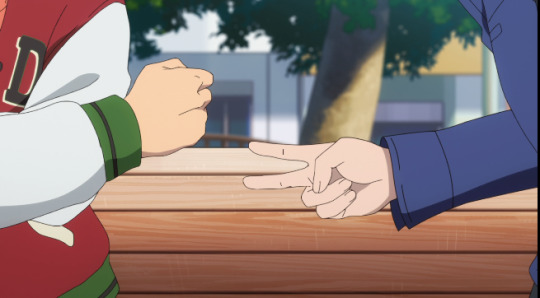
In Ep.3, we see Kazuki and Rei decide who will go and purchase the sweet potato for Miri. In order to decide this, they use Rock-Paper-Scissors. In Japan, the game is called janken and is used in classrooms to decde everything: which row or group in class will go first? Janken. There is a tie, who will win the game? Janken. A student or students are out of class today so there is some extra food left over, who will get it? Janken.
In many cases, this will be use to decide orders as well (like the winner goes first or last and then it goes in ascending or descending order from there). And it won’t just be between two people, they’ll do huge groups. When I worked as an ALT, I would often just trust my students or the JTE (Japanese Teacher of English) or Homeroom Teacher to figure out who won and lost, because I would always lose track... ^ ^;
Anyway, this way of deciding things is viewed as unbiased and a sort of “third-party” decision maker. A nice way to have a decision made without ruffling any feathers. And, we sometimes see using Rock-Paper-Scissors to decide things within the workplace and business world.
Some examples of this are provided on the website Japan Daily, which will be linked below. The website does lean a bit into Orentialism, imo, but it also has some good history and info on Rock-Paper-Scissors in Japan and these real life examples of it being used in a business/work environment are great:
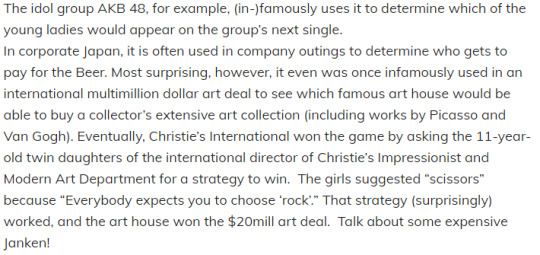
2. Baked Sweet Potato - Street Food
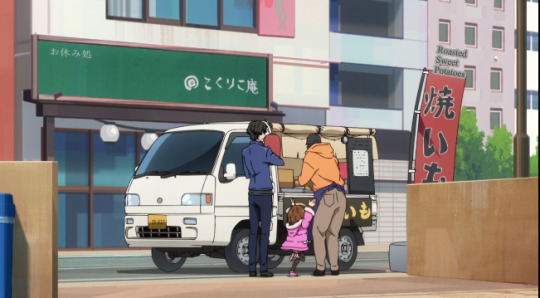
Baked sweet potato is a very common street food in Japan in the fall and winter months. They are cheap, smell delicious, are delicious, and are a great way to warm up cold hands. Nowadays, many are sold out of small, white vans like the one shown in Buddy Daddies.

(Image from Asahi Imports).
They are usually eaten plain and the inside tends to be a light, off-set white. Like ice cream trucks, the sweet potato vendors will usually set up shop around playgrounds, school areas, parks, etc. basically any place where a large crowd is likely, and they will usually shout out that they have sweet potatoes. In a similar way to the vendors walking around selling food, drinks, and peanuts at a baseball game or something.
You can read more about this winter time snack over at Asahi Imports, which will be linked below (they also make mention of daigaku imo, which is a dish you’ll see in Japanese school lunches in the fall and winter months, and which is very yummy!).
3. Obake - Ghosts

I was watching a reaction video to episode 3 of Buddy Daddies, and the reactor was like, “Isn’t she afraid of ghosts?” And, well, that made me think of a very popular song and book in Japan called おばけなんてないさ (Obake Nante Nai sa). It is a very famous children’s song and (later) picture book in Japan. The song was first broadcast on an NHK program called “Minna no Uta” in 1966. This info is from the website Hello Project Lyrics Wiki, and will be linked in the comments below.
When I worked at a Japanese cram school back here in the States, we had a bunch of copies of the books, and all the teachers had the book and song memorized. All the parents were familiar with it too, and it was taught in the youngest class, since the book and song is for the 0 - 2 year old age range.
Here is a Youtube video with the book and the song being sung to it. Warning: This song WILL get stuck in your head. The beat is very simple and easy to remember, so you’ll definitely end up humming it, even if you don’t know the lyrics.
undefined
youtube
I’ll link to English lyrics that I found for this song in the comments. But the general gist is that there is no such things as ghosts, they aren’t real, but if they were, I (a child) would be afraid of them. So the song goes on to tell of how you can befriend a ghost instead, and not be afraid of them anymore.
Miri is 4 years old, and can write her name, speak and understand well, and has good coordination skills. So there has been some level of education, so she has likely heard this song before. And therefore probably isn’t afraid of ghosts on a more conceptual level, though she still equates them with “bad guys,” lol. If she hasn’t learned it or heard it yet, she probably will now that she is in daycare.
There are four more issues/aspects that I plan on discussing, so I’ll put those under a Read More due to length and them being slightly less lighthearted.
4. Animal Rights
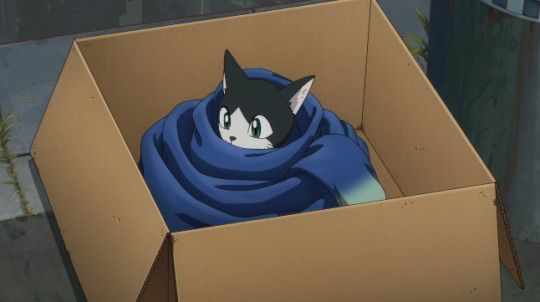
When I watched reaction videos to the first episode, many people were upset at the cat being returned to the box (and the cat even just being in a box to begin with). I was too, of course, but I also knew where this scene was coming from. For this section, I will be citing the article: Challenging, inadequate animal welfare in Japan, which I will link to below. Though, I also came across the article Why You Shouldn’t Buy a Pet in Japan, which I will also be linking below, since I think it is worth the read.

Basically, Japan has laws in place, and they get revised every 5 or so years, however, they are very vague and the general public knowledge of animal rights is farther behind than in other industrialized nations. In the other article that I will be linking below, they mention that about 90% of pets in Japan are bought through pet stores, rather than through adoptions or rescues. So, as the other article states, abandonment of pets is rather high, especially because of how trend-based pet ownership is in Japan.
Things like pet cafes can really influence pet trends. I’ve been to two myself, an Owl Cafe in Osaka and a Hedgehog Cafe in Tokyo.
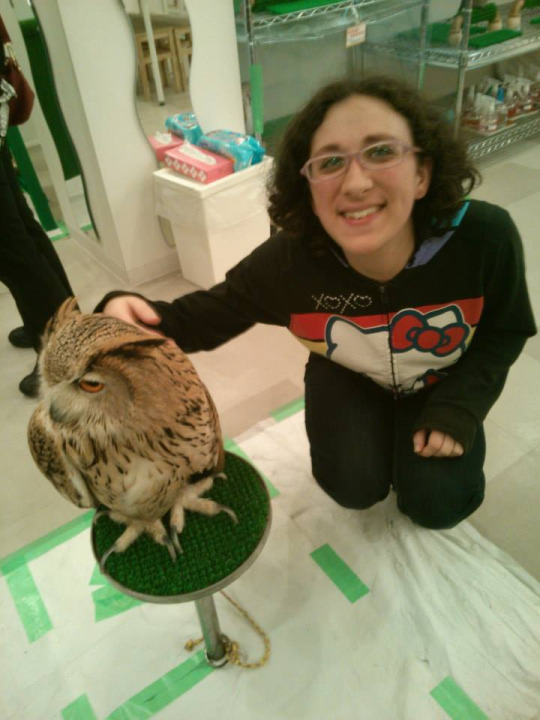
That was a number of years ago now. And while those experiences were AMAZING! I do think about the ethics of it all and think, if I were to return to Japan some day for a visit, those kinds of cafes wouldn’t be on my To Do list.
However, there are groups and organizations to help fight for animal rights in Japan. Since this section of the post was inspired by the scene with the cat in the box, I’ll highlight the cat based one mentioned in the article:

So that’s good to hear!
5. Parenting Style

Another thing I noticed during reaction videos were the responses to scenes like the above, where Miri is kicking at the back of Rei’s car seat and whining, “I wanna go swing!” As well as to scenes like below, where Miri caused all of Kazuki’s food supplies and materials to spill all over the ground.

All of them have made mentioned that moments like those require strict discipline. But, Japanese parenting style differs a bit when it comes to things like this. In an article entitled: Japanese Parenting Style - And Differences From the West, which will be linked to below, we get this bit on discipline:

Basically, it is saying that Japan isn’t really big on punishment because Japanese children learn to behave by learning the importance of cooperation and harmony through other social groups like school and sports. This is definitely true. What I’ve seen is that the expectation is that the children still don’t fully understand the ins-and-outs of society yet.
I worked at a Japanese daycare, so our job was to take a gentle parenting approach, to help explain to the child why what they did was hurtful or harmful or dangerous. And one of our goals was to help the children learn how to play amicably with each other.
That’s not to say that I haven’t seen children be yelled at or anything like that. I have. But it is usually the teachers that take on that mantel, especially at the junior high school level. That’s when you get stuff like students have to practice bowing during an assembly over and over and over again until they get it just right, especially if that assembly is a rehearsal for an important event, like graduation ceremonies.
Bringing this back to Miri though. Now that she is in daycare, she will start to receive this gentle parenting approach to learning how to co-exist with others, which will eventually result in more positive behaviors (or, that is the ultimate goal, anyway). Miss Anna will likely provide a lot of that guidance as the head daycare teacher.
6. Snack Bars

Miri’s mother works at a Snack Bar and, over on the official website, it states that her job is as both the Mama and singer at the Snack Bar and that she is 34 years old. But what is a Snack Bar and what is a Mama?

Snack Bars were started in 1964 to work around government laws that prevented adult entertainment establishments from staying open after midnight, by offering light snacks, that changed the category that they fell under, thus they could stay open. The Mama of the Snack Bar is basically the one in charge of the Snack Bar.
They are similar in ways to Hostess Bars, but on the cheaper side. You can read about more of the details about how they run and what not at the website Metropolis Japan, which I will link to in the comments.
Another thing about Snack Bars is that, while they don’t sell sex, they sell the fantasy and illusion of sex:

They are also a outdated nowadays (with their peak being back in the 80s), so there is a general seedy vibe about them. It may seem like an okay place to take kids from the name alone, but they are very much so adult-only spaces. Also, as we saw with Miri’s mother, likely a place and setting where the exploitation of women happens.
7. Casinos and Gambling in Japan
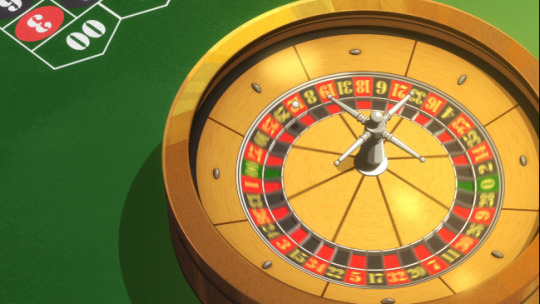
We saw Kazuki do some gambling in Ep. 1. Something you may have noticed, however, was who lured him in:
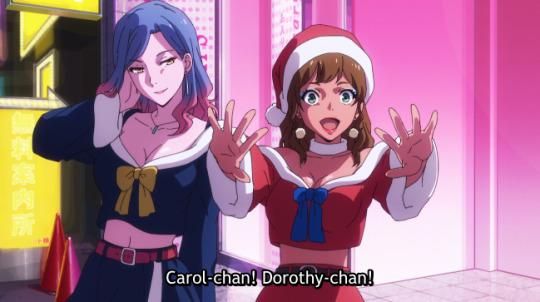
And what the outside of the establishment looked like:
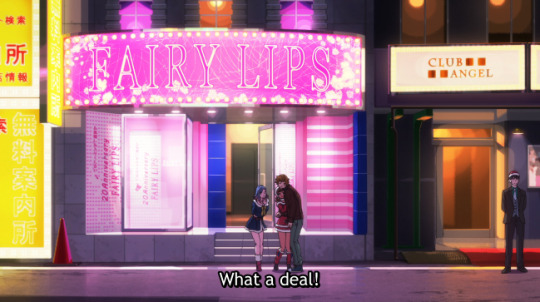
Two young and sexy women and a bright, sparkling pink building named “FAIRY LIPS.” You probably guessed that this isn’t a legal gambling establishment. Casinos and gambling are still largely illegal in Japan, with some exceptions like lottery. The ones that are illegal are likely being run by Yakuza.
However, some changes have gone into affect in more recent years, especially as a way to attract tourists.

Over on the Wikipedia page about Gambling in Japan (which will be linked below in the comments), it talks about how Japanese lawmakers approved a bill in July 2018 that officially allows casinos in the country. However, they come with a lot of restrictions, such as Japanese locals only being able to visit them three times per week or ten times a month, and Japanese visitors will be charged 6,000 yen entrance fees to discourage addiction.
And...that’s it for this post! Thank you all for reading this far and for all the love and support you’ve all shown to my previous post (and other meta posts I’ve made). I really and truly appreciate it! I’ll be keeping an eye out for topics like these in future episodes. Though, those posts should be a lot shorter, since I’ll be going on an episode-by-episode basis, instead of in bulk like this.
Until next time!
#Buddy Daddies#Kazuki Kurusu#Rei Suwa#Miri Unasaka#Misaki Unasaka#Japanese culture and society#Japanese politics#long post#meta post#image heavy post#Youtube
195 notes
·
View notes
Text
Too many books came in at the same time from my library queue, so @redheadgleek suggests a poll and yes, let’s poll! Y’all can see my… varied reading interests lol
What should I read next?
Daughter from the Dark: Late one night, fate brings together DJ Aspirin and ten-year-old Alyona. After he tries to save her from imminent danger, she ends up at his apartment. But in the morning sinister doubts set in. Who is Alyona? A young con artist? A plant for a nefarious blackmailer? Or perhaps a long-lost daughter Aspirin never knew existed? Whoever this mysterious girl is, she now refuses to leave.
The Brilliant Life of Eudora Honeysett: Wanting to organize an assisted death on her own terms, world-weary octogenarian Eudora Honeysett forges an unexpected bond with exuberant ten-year-old Rose, who drags her to tea parties, shopping sprees, and other social excursions.
Flesh and Bone and Water: André is a listless Brazilian teenager and the son of a successful plastic surgeon who lives a life of wealth and privilege, shuttling between the hot sands of Ipanema beach and his family's luxurious penthouse apartment. In 1985, when he is just 16, André's mother is killed in a car accident. Clouded with grief, André's father loses himself in his work while André spends his evenings in the family apartment with Luana, the beautiful daughter of the family's maid. Three decades later, and now a successful surgeon himself, André is a middle-aged father, living in London, and recently separated. One day he receives an unexpected letter from Luana, which begins to reveal the other side of their story, a story André has long repressed.
Geek Love: The Binewskis are a carny family whose mater- and paterfamilias set out-- with the help of amphetamine, arsenic, and radioisotopes-- to breed their own exhibit of human oddities. There is Arturo the Aquaboy, who has flippers for limbs and a megalomaniac ambition worthy of Genghis Khan. Iphy and Elly, the lissome Siamese twins. Albino hunchback Oly. And the outwardly normal Chick, whose mysterious gifts make him the family's most precious-- and dangerous-- asset. As they set out across the U.S., family values will never be the same.
Same Bed Different Dreams: March 1919. Far-flung Korean patriots establish the Korean Provisional Government to protest the Japanese occupation of their country. This government-in-exile proves mostly symbolic, its petitions ignored by heads of state as Korea's nationhood is erased. After Japan's defeat in World War II, the KPG dissolves and civil war erupts, resulting in the North-South split that remains today. But what if the KPG still existed now, today-working toward a unified Korea, secretly harnessing the might of a giant tech company to further its aims?
Unholy: why white evangelicals worship at the altar of Donald Trump: Fueled by an anti-democratic impulse, and united by this narrative of reverse victimization, the religious right and the alt-right support a common agenda--and are actively using the erosion of democratic norms to roll back civil rights advances, stock the judiciary with hard-right judges, defang and deregulate federal agencies, and undermine the credibility of the free press. Increasingly, this formidable bloc is also forging ties with European far right groups, giving momentum to a truly global movement forecasted to last long after the Trump era.
Comemadre: In the outskirts of Buenos Aires in 1907, a doctor becomes involved in a misguided experiment that investigates the threshold between life and death. One hundred years later, a celebrated artist goes to extremes in search of aesthetic transformation, turning himself into an art object.
I Who Have Never Known Men: A young woman is kept in a cage underground with thirty-nine other females, guarded by armed men who never speak; her crimes unremembered... if indeed there were crimes.
Road of Bones: Kolyma Highway, otherwise known as the Road of Bones, is a 1200 mile stretch of Siberian road where winter temperatures can drop as low as sixty degrees below zero. Felix Teigland, or "Teig," is a documentary producer, and when he learns about the Road of Bones, he realizes he's stumbled upon untapped potential. Accompanied by his camera operator, Teig hires a local Yakut guide to take them to Oymyakon, the coldest settlement on Earth. Teig is fascinated by the culture along the Road of Bones, and encounters strange characters on the way to the Oymyakon, but when the team arrives, they find the village mysteriously abandoned apart from a mysterious nine-year-old girl. Then, chaos ensues.
22 notes
·
View notes
Text
Bleach is Cyberpunk II
I've said before that Bleach's general setup is cyberpunk, but the truth is that its general structure is cyberpunk too. It's more or less the direct antithesis of a prototypical shōnen like One Piece, and its closest relative is actually Cyberpunk: Edgerunners. I'll come back to that later.
Ichigo (and Rukia and Kaien, and to some extent Yoruichi and Kisuke) are fundamentally un-Japanese in their nature as characters in outlook, mindset, and attitude, whatever their aesthetics and presentation. You need to understand that Karakura is a symbol of Japanese stagnation as it actually exists, while Soul Society is a kind of Platonic ideal of it. There's an interesting BBC article from a Tokyo correspondent of ten years who asserts:
Japan still feels like Japan, and not a reproduction of America. It's why the world is so thrilled by all things Japanese, from the powder snow to the fashion. Tokyo is home to superlative restaurants; Studio Ghibli makes the world's most enchanting animation (sorry, Disney); sure, J-pop is awful, but Japan is undoubtedly a soft-power superpower.
The geeks and oddballs love it for its wonderful weirdness. But it also has alt-right admirers for refusing immigration and maintaining the patriarchy. It is often described as a country that has successfully become modern without abandoning the ancient. There is some truth to this, but I'd argue the modern is more a veneer.
When Covid struck, Japan closed its borders. Even permanent foreign residents were excluded from returning. I called up the foreign ministry to ask why foreigners who'd spent decades in Japan, had homes and businesses here, were being treated like tourists. The response was blunt: "they are all foreigners."
A hundred and fifty years after it was forced to open its doors, Japan is still sceptical, even fearful of the outside world.
Karakura is metaphorically the modern veneer of the Seireitei (a place whose name literally means "Stagnant Pool of Souls"). The Seireitei, the heart of the secret world of Bleach, is the ancient, and Karakura is the veneer of modernity that exists on its "surface".
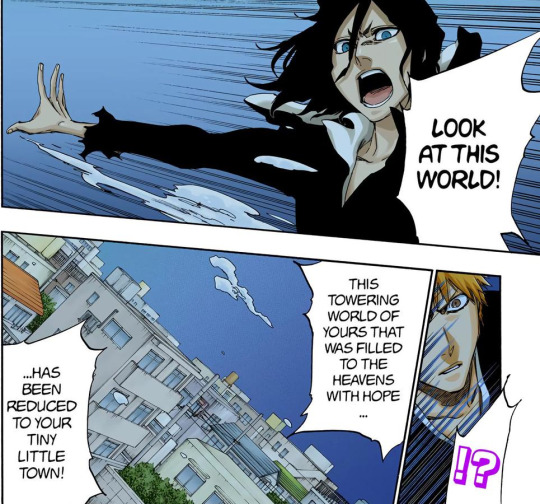
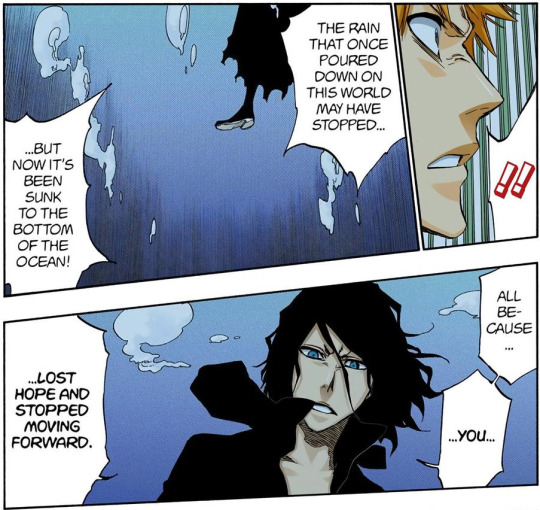
Karakura is by proxy also a symbol of stagnancy. As usual, this is directly called out by the manga. Karakura literally represents the death of Ichigo's dreams. (Have you ever wondered why he was working so many jobs while he was depowered and getting as much money as he could? He was planning to leave after graduating high school because he hates Karakura.)
Ichigo shows his defiance of this stagnation by abandoning Japanese cultural norms: he's anti-authority, pseudo-delinquent, defiant, disrespectful, and generally just kind of a punk, but he has a heart of gold. His greatest hope is to effect change.
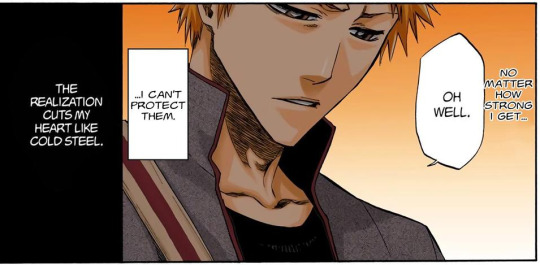
When Rukia appears and offers the possibility of changing things, Ichigo jumps at the opportunity.
But the major theme of the manga is that everyone (not just Ichigo) is ultimately ground down by the system and submits to leading quiet lives instead of keeping up resistance to the bitter end. They're defeated. Ichigo stays in Karakura.
You're directly told that grand sweeping gestures and plans don't work. This is the point of Aizen's whole saga. This tells you something about Kubo's politics and more generally reflects the Japanese shōganai (しょうがない) attitude, but that isn't really the point here. What's underlined (but absolutely not highlighted) is that successful resistance is subtle and gradual, corruption of the status quo rather than a revolution against it, whether it be along political (Shunsui, Nayura), informational (Kisuke, Shūhei), or scientific (Kisuke, Mayuri) lines. This is actually a primary focus of CFYOW as a text if you read between the lines.
I've said before that Bleach is basically an antishōnen because it subverts the whole nakama premise, and I've doubled down on that, but it's also one thematically, because it's also about world-weary cynicism and the gradual disaffection of youth: "growing up" to set aside "childish ideas" like changing the world.
It's initially set up like a typical shōnen only to bait-and-switch you. You wanted a raucous punk adventure? Well fuck you, you get a depressingly realistic death of dreams, just veiled in goofy supernatural metaphor.
This is why I say its closest relative is Cyberpunk: Edgerunners, something from Studio Trigger which you initially think is going to end in a triumphant defeat of Arasaka by David and company, much like their previous Kill La Kill did, only to end in tragedy. Ichigo, like David, is "built different" only for it to ultimately not make a difference in the end. Rukia, like Lucy, comes into his life and completely changes it. Orihime, like Rebecca, really wants nothing more than to be noticed by him as a woman.
Unlike their counterparts in Cyberpunk: Edgerunners, Ichigo and Orihime don't actually die. But their hopes and dreams do. Ichigo doesn't want to be in Karakura, but he is. Everyone has chosen to knuckle down because:

And when does Yhwach appear? When Ichigo and Orihime get married? No. When Kazui is born? No. Only when Rukia shows up again. Huh. It's almost like they chose to be miserable just to survive rather than go out in a blaze of personal defiance but couldn't quite extinguish that last spark, and that's what Yhwach keyed in on.
It's a bad ending where the system wins, because the system is too big for any one person to overcome. Even when Yhwach is defeated, Soul Society and the reincarnation cycle and all its inequities continue to trundle on, just like Arasaka and really the megacorps in general of which Arasaka is merely one. (And even in Cyberpunk—the setting not the genre—in actuality behind the megacorps still stand the national governments. There is always a bigger fish.)
Everyone just has to make their peace with the nature of the world or die as they're crushed by it.
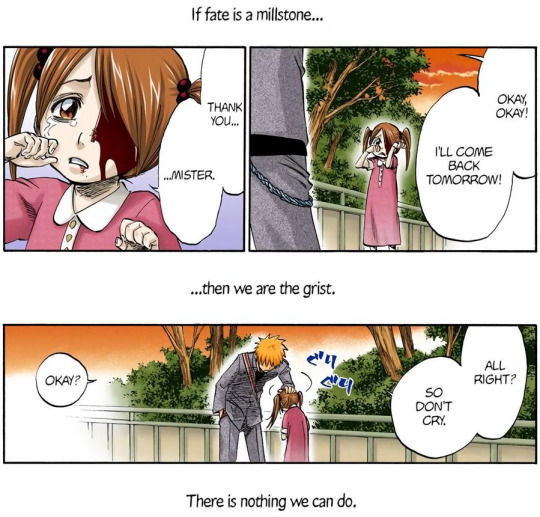
If fate is a millstone then we are the grist. There is nothing we can do.
And then you get No Breathes From Hell, where everyone is smiling again! But...
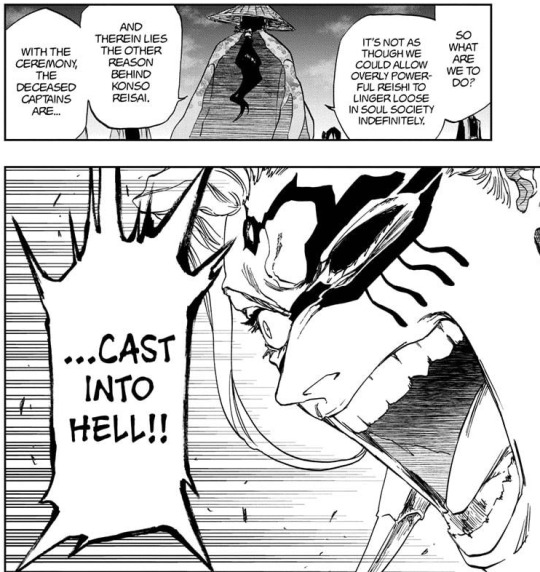
... They learn they're all destined to go to Hell, among other things. I told you about the bigger fish. So not only did nothing actually change, but really everything only got that much worse. Which again is pretty much a hallmark of cyberpunk settings.
98 notes
·
View notes
Text
Comic Box 1997 End of Evangelion Issue - Archive Scan
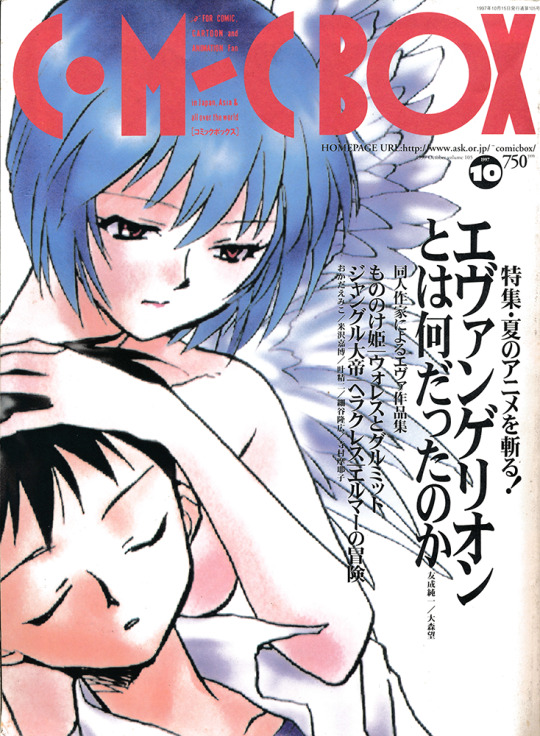
Comic Box was a magazine in Japan launched in, from what I can gather, 1982. It was a bit of an ‘alt” magazine - it has an imprint, Comic Box Jr, which focused on doujinshi for example - and would cover anything anime-adjacent, including western films. The October 1997 release of the magazine was dedicated to the release of the End of Evangelion film, and to answering the question “what was the phenomenon called Evangelion?”. Towards that end it features fan submissions, art, comics, essays, all talking about what Eva meant to them. Some are serious, some are fully comedic, way way more than I expected are erotic, and overall it is a time capsule of how the anime community was thinking about Evangelion when EoE came out. The magazine dissolved in 1998 from what I can tell, so this was one of its last releases - you can still see its absolutely vintage website here! Complete with dashing chibi cat gif.
I discovered this magazine through japanese anime/manga archivist-in-residence ehoba on twitter, who provided photos and rough summaries of some of the pages. They are just camera photos of an open magazine though, not scans, and not at all complete. I hunted around for a while to find a scanned version, messaged ehoba and a few others, posted on forums like Evageeks, and drew total blanks. I couldn’t find any listings of it online, so I set the quest aside...until I was placing another order for some artbooks for import and decide to check Yahoo Auctions Japan and lo and behold, there is was! It arrived this week.
So that image above is not one pulled from the internet - I have scanned the entire Evangelion segment of Comic Box - October 1997 issue. I am a neophyte scanner & image editor, these aren’t gonna be amazing or anything, but while I hope to make a more polished version I wanted to share the drafts now. I really aspire to translate it, but of course I don’t speak Japanese, so I am going to see how far working with some people I know and brute-forcing with AI would go. If you are interested or know someone who would be, definitely reach out! 100% would crowdsource this. If someone already scanned and translated this, also let me know, I would groan heavily and curse my google skills but i’d rather it be available and know, and not waste time.
Below will be some reduced-down PNG’s of the magazine to fit Tumblr image limits with Ehoba’s notes and a few of my own attached to them. A link to the full images as a singular PDF is on the Internet Archive [Here]


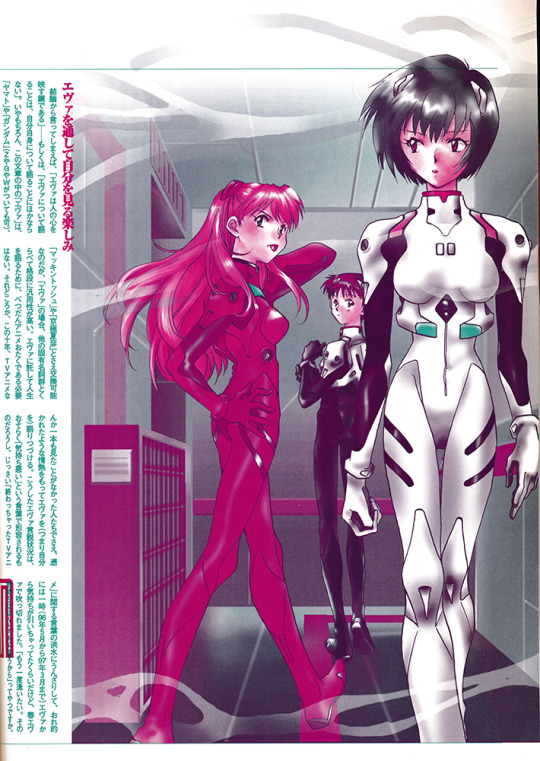
A reflection of a very known thing in this magazine is that, from my perspective, End of Evangelion is definitely Asuka’s moment to shine, but it didn’t matter because the 90′s Eva fandom *loved* Rei. She was the most popular by far, and I think dethroned Sailor Mercury on the ‘best girl’ polls in magazines of the era. Nowadays if you poll audiences - as the NHK did recently - Asuka is the most popular girl, but it was a different, proto-moe-boom time.
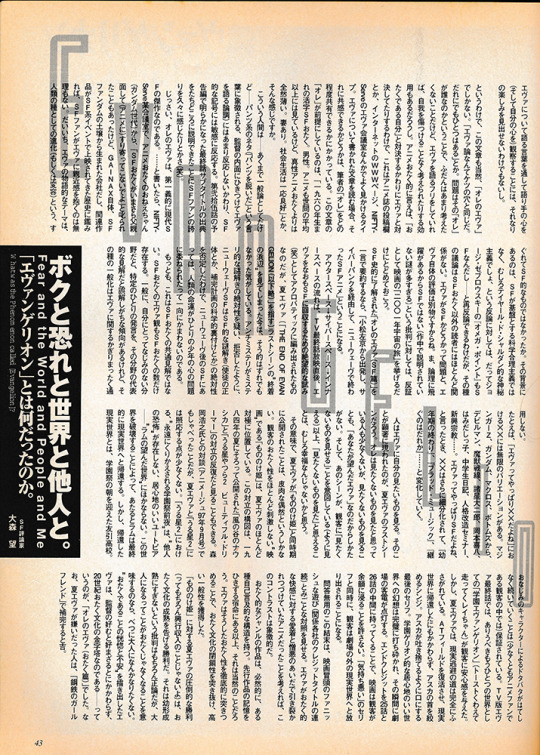
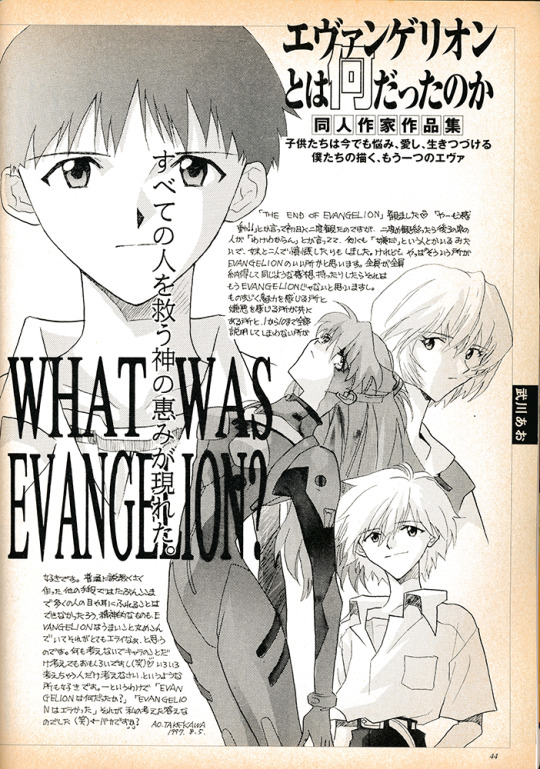


"Evangelion was fake. A fake made by one director, or by the staff. However, it was a very real fake. God, it was so good."

Watermelon Kaji absolute goat here; so cool indeed
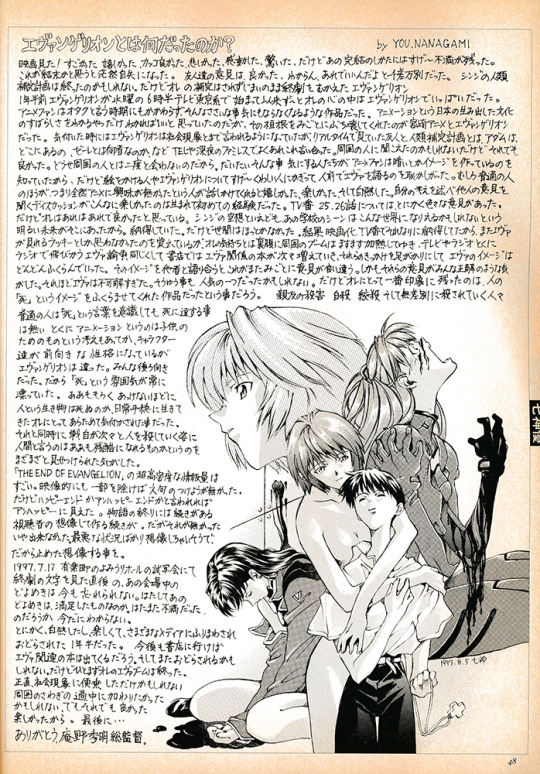
How much Asuka is suffering in all these images vs god-salvation Rei is, again, saying alot about the waifu wars.

"I don't think episode 25 and 26 were professional work. I understand that the ADR script and previews with layout sheets are supposed to be avant-garde, but something is wrong with it." "TV show is not an individual's job, so I wanted them to deal with the schedule limitation."
90% sure this Asuka ‘escaped’ and I saw it on the internet in the early 2000′s - maybe the author published it elsewhere in a doujin, I assume a lot of this art would have been repurposed for other mediums.
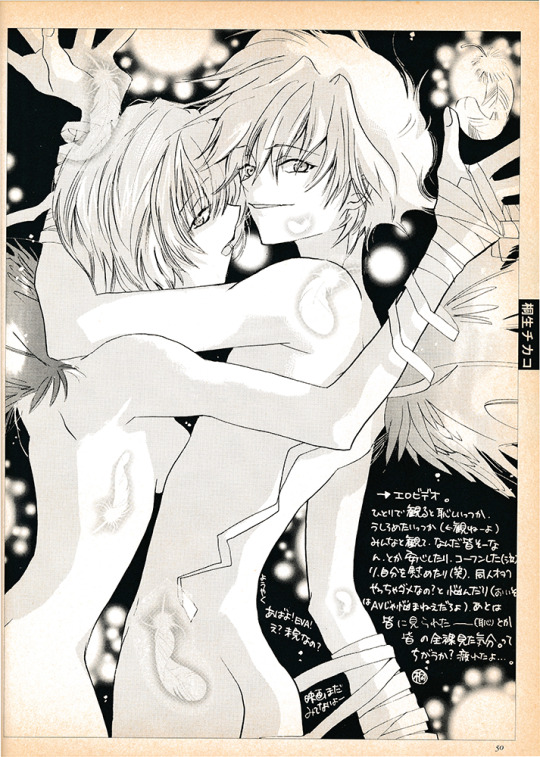
Honestly the art is incredible for this magazine sometimes, the splash pages they have are filled with Evangelion’s anime-spiritual energy.

"Unit 02 has a mouth, which means it can give a blow job." "The biggest surprise is Rei in cowgirl position. The official content does that, so hentai authors have nothing to do."
(Gainax putting hard-working hentai doujin authors out of a job, what assholes!)

"My heated up feeling toward Evangelion was quick-freezed by episode 25 and 26. EoE defrosted it, but now I feel distant from Evangelion."
How much Episode 25-26 come up here is great evidence for how divisive they were - End of Eva is absolutely seen as commentary on, and opposition to, the TV ending. I think in the west the initial reception of the original ending is overall more positive? Certainly nowadays, would be curious how it is seen in Japan today.

OCR’ing this image will literally murder me, pls I can’t
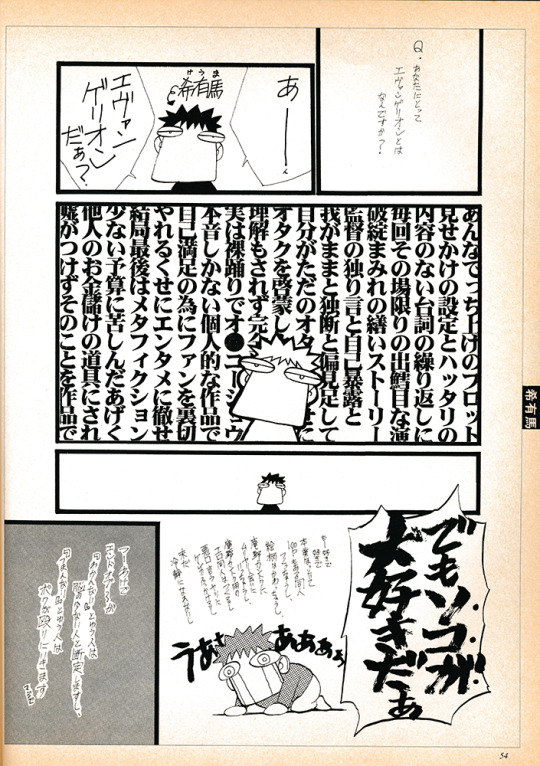
"Bullshit plot, surficial information, shallow dialogues, inconsistent direction, story with tons of plot holes, the director's masturbation, the otaku's useless attempt to enlighten other otaku..." "BUT I LOVE IT."
10/10 take

"'Sincerity' of someone I don't like just confirms that I still don't like them. Anno apparently thought that honest depiction of himself can be depiction of otaku, but that's not wrong. Anno is exceptionally creepy."

God-tier Anno portrait here. I love how many of this art showcases “settings” from End of Eva and which ones hit the audience - re-using the movie theatre seats for Shinji, that is really cool!


Evangelion - Slayers edition! The artist names are in the black box panel on the page lining, I absolutely hope to track down a few of them and see what kind of works they made.


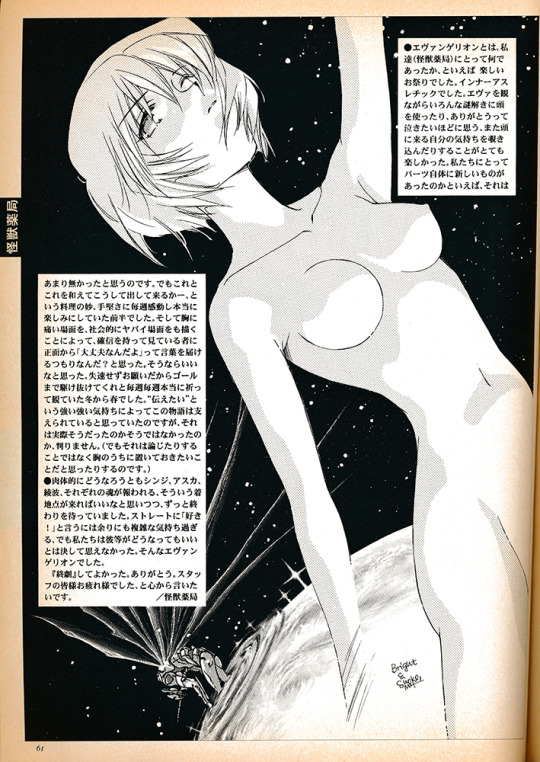
"I think each material of Evangelion was nothing new. In the early half, however, I was moved by their techniques of arranging and remixing those materials." "Creators' strong desire for expression supported this story, but I'm not sure."
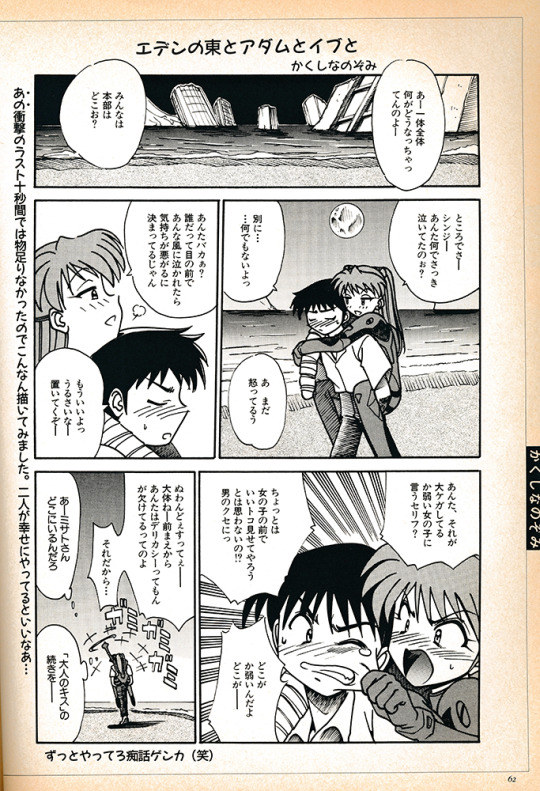
"Adam and Eve in the Eden East" "I hope they will live happily after the ending."
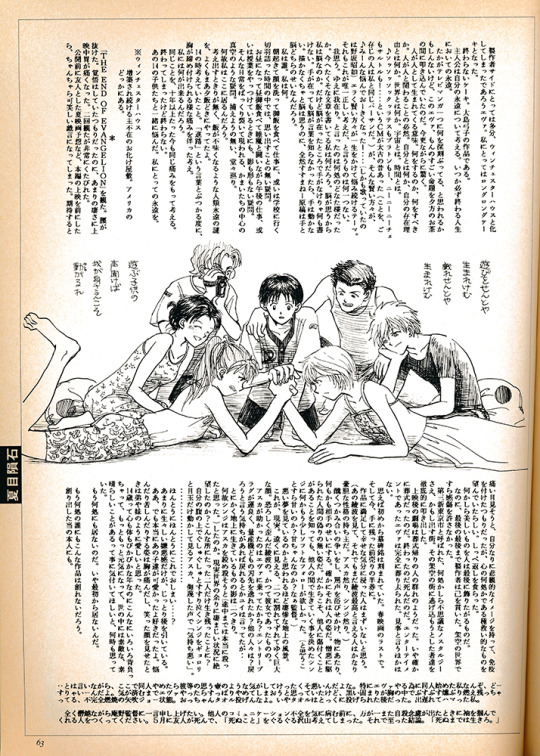
"The theater was like a funeral after the screening. No, I should say it was a literal funeral. Evangelion ended, it died. In terms of entertainment, Evangelion was completely and brilliantly killed."
Kaworu’s insta-inclusion into the ranks of the kid cast is always amusing to me; he is in one episode of the show after all, barely in Eva! But he is all over the art immediately. The power of design - and also being one of the first gay characters on television (as opposed to OVA’s) in Japan.

Hopefully if I can make progress on translation I can have actual thoughts to add to the scan, certainly I will post results if I get them.
I value, way too deeply to be honest, the preservation of the other side of the ‘media mix’ - how people responded to the media in question and what it meant to them. It is way more likely to be lost than the media itself or documents from the production side. May this contribution to preserving a bit of that experience be of value to those out there who would be interested in the history of Evangelion, and anime more generally.
If you think you know anyone or your followers overall would be interested in translation help, I would appreciate the broadcasting!
103 notes
·
View notes
Text
My Favorite New Manga Reads of 2023
For the past few years on twitter, I've made threads of some of my favorite manga and light novel reads from the past year. This year, I decided I would move it over to two tumblr posts.
After the cut are some of my favorite titles that I picked up for the first time in 2023.
Talk to My Back, Yamada Murasaki
I like to pick up something a little more unusual at least once a year and so at the beginning of this year, I picked up this 1980s alt-manga title about the life of a Tokyo housewife played out in short vignettes. It's a frustrating read because of how real it feels and how much it feels like things haven't changed as much in the last 40 years as I'd like, but it's all the more fascinating for it. The essay at the end discussing Yamada Murasaki's work and placing it in context was a nice bonus too.
When a Cat Faces West, Yuki Urushibara
I love Yuki Urushibara's Mushishi (slow though I have been to actually finish it), so when Kodansha announced a license for Urushibara's much shorter series, I was there for it. It has a cool concept - there are areas of "flow" that will pop up out of nowhere and shift people and places out of time and space and one guy has tasked himself with helping people fix issues caused by it - but mostly it feels like Mushishi but set in the present day. I love a series that's just vibes all the way down.
Skip and Loafer, Misaki Takamatsu
I was absolutely smitten with the Skip and Loafer anime, so when it ended with what felt like a pretty definitive "we are not making a second season of this" final episode, I started the manga. A high school slice of life series lives by its characters and Mitsumi is the more adorable dork ever. The other characters are equally delightful, even when I don't necessarily like them, and I'm so eager to dive deeper into their lives.
Associate Professor Akira Takatsuki's Conjecture (light novel), Mikage Sawamura
This series feels a bit like what you'd get if you crossed The Case Files of Jeweler Richard and The Night Beyond the Tricornered Window: a college student with a supernatural ability to hear lies that alienates him from everyone meets a folklore professor with a mysterious past fascinated by mysteries, and together they investigate possibly-supernatural events. It's a bit silly, but the relationship between the leads is interesting and there's a lot of fun urban legends in the mix. There's also a manga adaptation that I haven't yet picked up, but maybe one day...
March Comes in Like a Lion, Chica Umino
I was curious about this one from the second Denpa announced the license just because of how much I'd heard about the series for years now, and it did not disappoint. I love a good story about a depressed and lonely teenage boy sublimating his feelings into an obsession with a uniquely Japanese pastime, especially when there's so many people around him wanting to help him stop being alone. Now I just wish that the release wasn't quite as slow as it has been, even if I know the many reasons why...though at least I still have the anime to rewatch while I wait.
Don't Call It Mystery, Yumi Tamura
After reading Basara and Wild Com, I was eager to get my hands on a newer series by Yumi Tamura, and the fact that it's a modern-day non-fantasy series made it all the more interesting. Totonou's incessant observations about the things going on around him are delightful, especially when they lead him straight into all kinds of dangers or even just leave everyone around him wishing he'd stop talking for about five seconds. I just want to pat him on the head and ask him to make me some curry.
After the Rain, Jun Mayuzuki
I got a card for the Japan Foundation's ebook library not too long ago, which has been great for picking up a lot of books that aren't available in my local library's collection, including this series. I had heard about it but was a bit hesitant because it's about a teenage girl who gets a crush on her much older boss...but hey, why not give it a try from the library? I'm glad I did because there was such a sweet relationship between them that ultimately helped them both out of the ruts they were in with their personal lives and dreams.
River's Edge, Kyoko Okazaki
I still can't decide if I actually enjoy Kyoko Okazaki's work or not, but I got a little closer to it with River's Edge. It's a harsh story about disaffected teenagers who find a dead body, but somehow it feels less depressing than the other works of hers I've read because they're teenagers and there's still the possibility that they can escape the lives that are dragging them down. I will say this - Okazaki's stories are never boring, whether I enjoy them or not.
Her, Tomoko Yamashita
I got a little overambitious this year and ordered the Italian release of a Tomoko Yamashita title I've been wanting to read for years. Can I read Italian? No. Did I think maybe I could figure it out kinda okay because I've studied French and Spanish? Yes. Did I end up reading everything through a translation app? Also yes. But this collection of interconnected stories about women and relationships was excellent despite the language barrier. I was thrilled to finally see the context for the kiss between a younger woman and an elderly woman that I so admired in Yamashita's 15th anniversary artbook, and its story was a touching exploration of what "normal" means. I would love to see this in English, but unfortunately I can't see it getting picked up.
Glitch, Shima Shinya
I was thrilled that Yen Press decided to pick up another title from Shima Shinya after Lost Lad London, and Glitch has been well worth my time. While it is a fantasy story about a town full of glitches in reality that I'm excited to see play out fully, what really caught my eye is the sheer amount of diversity in the characters - one of the leads is nonbinary, there are mixed race characters, there's a lesbian couple, etc. It's all part of the story but not in a didactic way, which I appreciate immensely. Shinya's art also makes me so happy, and I hope Yen continues to get more of their work.
Lilies and Voices Born Upon the Wind, Renmei
Speaking of diversity in characters, I enjoyed this series not only because it was a nice yuri with a motorcycle lesbian (always a bonus in my book, the motorcycle) but because it had some really thoughtful discussion of asexuality in multiple forms. I wish I could've gotten one of the printed copies that were available for purchase at one con, but alas.
Witch Hat Atelier Kitchen, Hiromi Sato & Kamome Shirahama
Did we really need a cooking series spinoff of Witch Hat Atelier? Probably not. Am I glad we got it in English anyway? Absolutely. This is basically an Olruggio/Qifrey slowburn domestic au fanfic and I adore it. And I love that they keep up the conceit about magical ingredients in each chapter's recipe, even though they are legit recipes you can actually make with the real ingredients recommended as substitutions. What Did You Eat Yesterday? but with witches, clearly an ideal combination.
Scribbles, Kaoru Mori
I am not actually a diehard fan of Kaoru Mori's work - I drifted away from A Bride's Story when I ran out of volumes at the library - but I do unabashedly adore her art. Scribbles is just perfect for me with its pages from her sketchbooks and her commentary about things like the ideal skirt tightness. I bought this in hardcover and all and will continue to get the other volumes in hardcover even though I almost always get Yen Press titles digitally because it's so much cheaper that way, that's how much I like it.
Innocent, Shin'ichi Sakamoto
I've had my eye on Shin'ichi Sakamoto's work for a while because I saw a bunch of panels from Innocent on here and fell in love with the art. What I did not expect was that the violently erotic story about a French executioner would actually get an English license. It's gorgeous and violent and weird and I am so here for it. Now, if I could just be sure that Dark Horse actually plans on releasing the whole thing...
Barbarities, Tsuta Suzuki
Much like with Innocent, I saw panels from Barbarities on here ages ago and wished I could read it without much hope, given the lack of other licenses for Tsuta Suzuki's bl since SuBLime's relicense of A Strange & Mystifying Story ages ago. But thankfully I am getting to read this nebulously historical drama with all of its social machinations and pretty men getting flustered by other flirtatious pretty men. And such nice clothes!
A Home Far Away, Teki Yatsuda
Kuma really gets some stellar licenses and A Home Far Away was especially good. Set in 1990s America, it reminded me of nothing so much as My Own Private Idaho crossed with Banana Fish and made me weep absolute buckets in the end. I don't think it's for everyone, but if you were ever an aficionado of depressing 90s queer cinema like I once was, this might be one for you.
À vos cotés [Tonari ni], Basso
I was shocked when the announcement for the French release of this title crossed my twitter timeline earlier this year - France has even less by Natsume Ono than the US does, but one of their publishers managed to get one of her actual bl titles published under her bl penname? So naturally, I had to get it. It's super sweet, about a young man who likes to take photos of horses at a racetrack who meets a much older man, and I swear reading it was just like reading her non-bl work only this time the two characters actually got to say their feelings out loud. This would be a perfect addition to several mainstream US publishers' bl lineup, and I would be the first in line to buy it if they did license it in English.
Dear, My God, Nemui Asada
More by Nemui Asada in English! I love Asada's work for its unique storylines and this one didn't disappoint, with a story about a priest having sex with a cult member to help save him and another story about a guy who ends up with a talking plant. It's a bit disappointing that it's only available on futekiya - when will we get some of these titles in print already?
Ikigami & Donor, Hiko Yamanaka
Hiko Yamanaka is another one whose work is always a bit outside the mold, and Ikigami & Donor is an interesting sci-fi bl about powerful "living gods" who have tremendous abilities but can't heal from injuries without blood, bodily fluids, or tissues from one specific donor. It's a fascinating concept and the way the relationship between one ikigami and his donor played out made for an interesting story. I hope to see more from Yamanaka one day.
#2023 manga reads#tomoko yamashita#natsume ono#nemui asada#hiko yamanaka#teki yatsuda#tsuta suzuki#shin'ichi sakamoto#kaoru mori#hiromi sato#kamome shirahama#renmei#shima shinya#kyoko okazaki#jun mayuzuki#yumi tamura#chica umino#misaki takamatsu#mikage sawamura#yuki urushibara#yamada murasaki
17 notes
·
View notes